Sony A3880033 GSM 850/900/1800/1900 GPRS / EDGE / UMTS FDD1&2&5 HSPA mobile phone with Bluetooth, WLAN, A-GPS, FM receiver User Manual Sony Ericsson Mobile Communications AB
Sony Mobile Communications Inc GSM 850/900/1800/1900 GPRS / EDGE / UMTS FDD1&2&5 HSPA mobile phone with Bluetooth, WLAN, A-GPS, FM receiver Sony Ericsson Mobile Communications AB
Sony >
Contents
08 user manual 1
Contents
Getting started..............................................................................4
Touch symbol.....................................................................................4
Assembly............................................................................................4
Phone overview...................................................................................5
Turning on the phone..........................................................................5
More information.................................................................................6
Charging the battery...........................................................................7
Maximising battery performance.........................................................7
Antennas.............................................................................................7
Screen icons.......................................................................................8
Touch functionality..............................................................................8
Menu overview..................................................................................10
Navigation.........................................................................................11
Memory............................................................................................12
Phone language................................................................................13
Entering text......................................................................................13
Calling..........................................................................................15
Making and answering calls..............................................................15
Contacts ..........................................................................................18
Speed dial.........................................................................................20
More calling features.........................................................................20
Imaging........................................................................................24
Using the still camera........................................................................24
Using the video camera.....................................................................27
Working with photos.........................................................................29
Accessing videos in your phone........................................................32
Music ..........................................................................................34
Accessing music in your phone.........................................................34
Stereo portable handsfree.................................................................35
Music player......................................................................................35
PlayNow™........................................................................................38
TrackID™ .........................................................................................38
Online music and video clips.............................................................38
Radio ...............................................................................................38
Record sound ..................................................................................40
Transferring and handling content...........................................41
Handling content in the phone..........................................................41
Sending content to another phone....................................................41
Using a USB cable............................................................................41
1
This is an Internet version of this publication. © Print only for private use.
Transferring content to and from a computer....................................42
Phone name.....................................................................................43
Using Bluetooth™ wireless technology..............................................43
Backing up and restoring..................................................................44
Updating your phone.................................................................45
Updating your phone using Sony Ericsson PC Suite..........................45
Update your phone wirelessly............................................................45
Messaging...................................................................................46
Text and picture messages...............................................................46
Conversations...................................................................................47
Voice messages................................................................................47
Email.................................................................................................47
Internet .......................................................................................50
Web browser toolbar.........................................................................50
Web browser shortcuts.....................................................................50
Bookmarks.......................................................................................50
History pages....................................................................................51
More browser features......................................................................51
Internet security and certificates........................................................52
File transfers......................................................................................52
Web feeds........................................................................................52
Facebook™......................................................................................53
Connected home........................................................................54
Wi-Fi™..............................................................................................54
DLNA™............................................................................................54
Remote Play with PLAYSTATION®3.................................................55
GPS..............................................................................................56
Using GPS........................................................................................56
Google Maps™ for mobile................................................................56
Driving directions...............................................................................56
More GPS features............................................................................57
Synchronising.............................................................................59
Synchronising using a computer.......................................................59
Synchronising using an Internet service.............................................59
More features.............................................................................60
Flight mode.......................................................................................60
Alarms..............................................................................................60
Calendar...........................................................................................61
Notes................................................................................................61
Tasks................................................................................................62
Profiles..............................................................................................62
Time and date...................................................................................62
2
This is an Internet version of this publication. © Print only for private use.
Themes.............................................................................................63
Main menu layout..............................................................................63
Ringtones..........................................................................................63
Screen orientation.............................................................................63
Games..............................................................................................64
Applications......................................................................................64
Antivirus............................................................................................64
PIN codes.........................................................................................65
IMEI number.....................................................................................66
Stereo Streaming Bluetooth™ Headset MH100......................67
Introduction.......................................................................................67
Charging...........................................................................................67
Turning on and off.............................................................................67
Pairing the headset...........................................................................67
Adjusting the volume.........................................................................68
Calling...............................................................................................68
Listening to music.............................................................................69
Resetting headset.............................................................................69
Battery..............................................................................................69
Troubleshooting................................................................................70
Troubleshooting.........................................................................71
Common questions...........................................................................71
Error messages.................................................................................73
Index............................................................................................75
3
This is an Internet version of this publication. © Print only for private use.
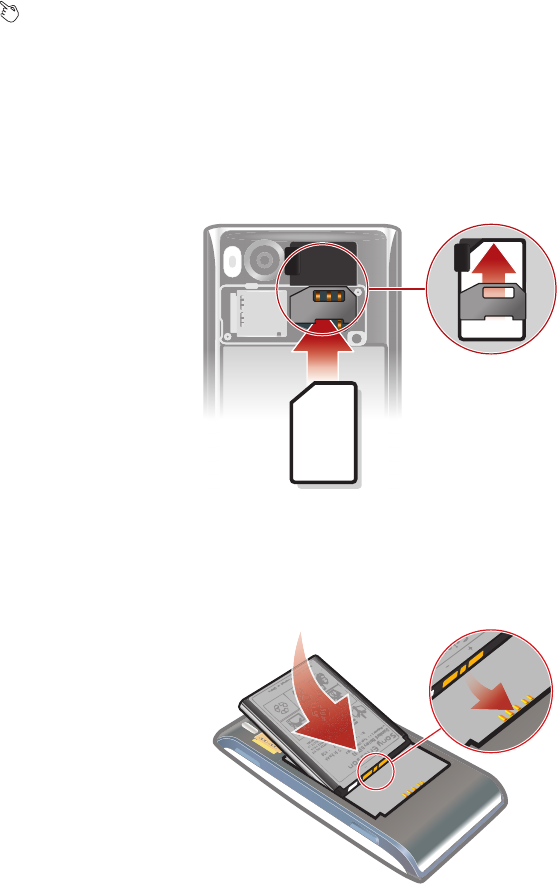
Getting started
Touch symbol
Instructions illustrated with a touch icon, or highlighted in grey, refer to touch screen
functions only.
Assembly
Before you start using your phone, you need to insert a SIM card and the battery.
To insert the SIM card
1Remove the battery cover.
2Slide the SIM card into its holder with the gold-coloured contacts facing down.
To insert the battery
1Insert the battery with the label side up and the connectors facing each other.
2Attach the battery cover.
4
This is an Internet version of this publication. © Print only for private use.
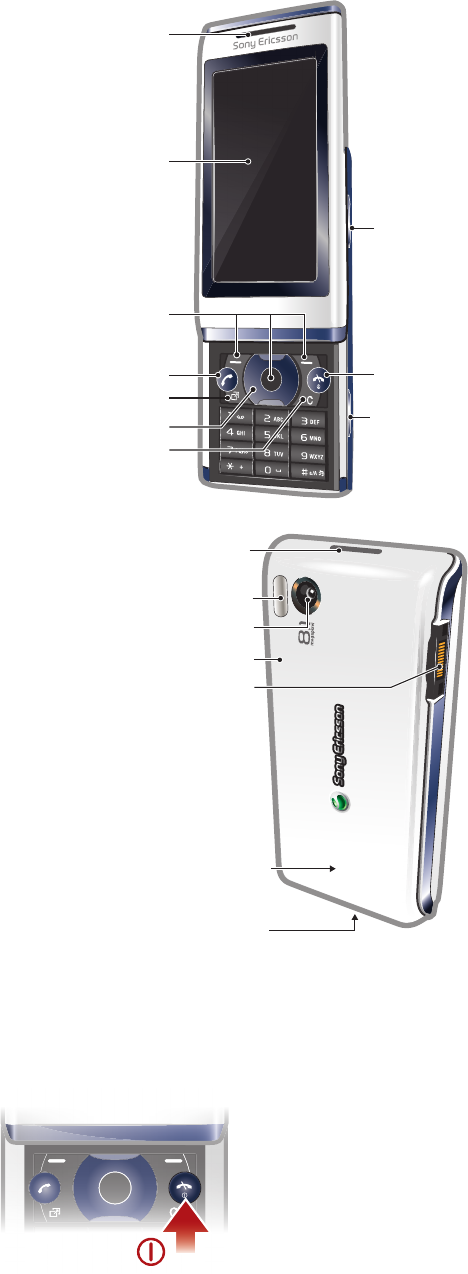
Phone overview
1 Ear speaker
1
2
3
4
5
6
7
8
9
10
2 Screen
3 Selection keys
4 Call key
5 Activity menu key
6 Navigation key
7 C key (Clear)
8 Volume key
9 End key, On/off key
10 Camera key/shutter key
11 Screen lock key
11
12
13
14
15
16
17
12 Flash light
13 Camera lens
14 Memory card slot (under the cover)
15 Connector for charger, handsfree and USB cable
16 Antenna
17 Loudspeaker
Turning on the phone
To turn on the phone
5
This is an Internet version of this publication. © Print only for private use.

1Press and hold down .
2Enter your SIM card PIN (Personal Identification Number), if requested, and select
OK.
3Select a language.
4Follow the instructions that appear.
If you want to correct a mistake when you enter your PIN, press .
SIM card
The SIM (Subscriber Identity Module) card, which you get from your network operator,
contains information about your subscription. Always turn off your phone and detach the
charger before you insert or remove the SIM card.
You can save contacts on the SIM card before you remove it from your phone.
PIN
You may need a PIN (Personal Identification Number) to activate the services and functions
in your phone. Your PIN is supplied by your network operator. Each PIN digit appears as
*, unless it starts with emergency number digits, for example, 112 or 911. You can see and
call an emergency number without entering a PIN.
If you enter the wrong PIN three times in a row, the SIM card is blocked. See SIM protection on
page 65.
Standby
After you have turned on your phone and entered your PIN, the name of the network
operator appears. This view is called standby. Your phone is now ready for use.
Using other networks
Making and receiving calls, using messaging, and data transfer, for example, Internet-
based services, outside your home network (roaming), may incur additional costs. Contact
your operator for more information.
More information
In addition to this User guide, Feature guides and more information are available at
www.sonyericsson.com/support.
To access the User guide
•Select Menu > Settings > User help > User guide.
To view tips and tricks
•Select Menu > Settings > User help > Tips and tricks.
To view information about functions
•Scroll to a function and select Info, if available. In some cases, Info appears under
Options.
To view the phone demonstration
•Select Menu > Entertainment > Demo tour.
To view the phone status
•Press the volume key. Phone, memory and battery information is shown.
Supported services and features
Some of the services and features described in this User guide are not supported by all networks
and/or service providers in all areas. Without limitation, this applies to the GSM International
6
This is an Internet version of this publication. © Print only for private use.
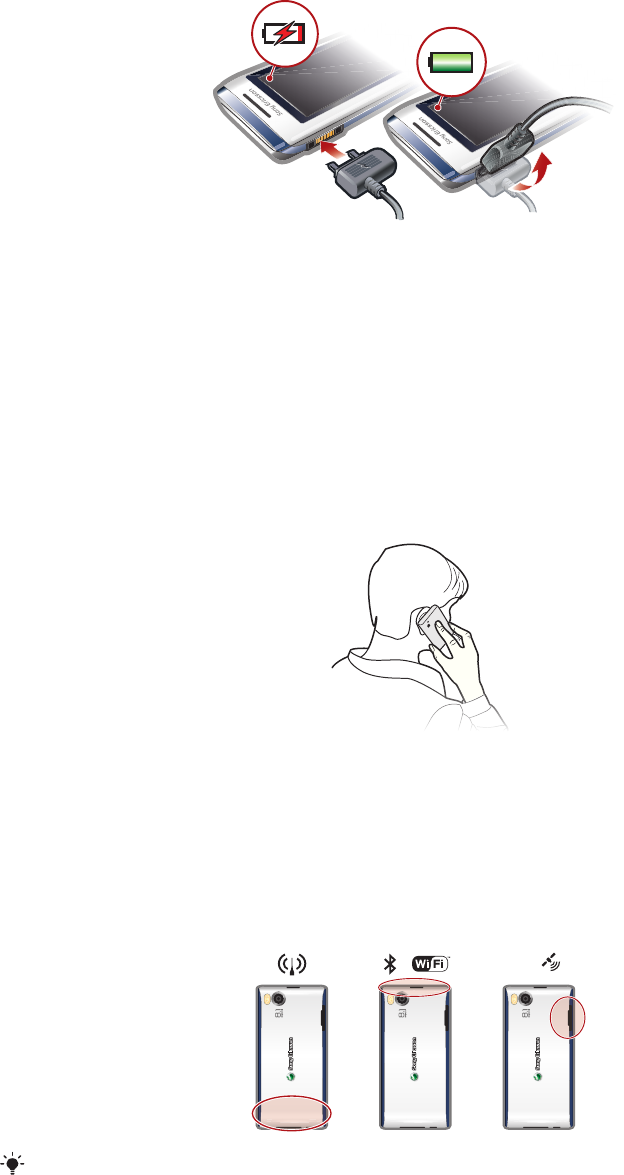
Emergency Number 112. Please contact your network operator or service provider to determine
availability of any specific service or feature and whether additional access or usage fees apply.
Charging the battery
The phone battery is partly charged when you buy it.
To charge the battery
1Connect the charger to the phone.
2Remove the charger by tilting the plug upwards.
Maximising battery performance
•Charge your phone often. The battery lasts longer if you charge it frequently.
•If you are in an area with no coverage, your phone repeatedly scans for available networks.
This consumes power. If you cannot move to an area with better coverage, turn off your
phone temporarily.
•Turn off 3G, Bluetooth wireless technology and Wi-Fi™ when you do not need these
functions.
•Do not cover the phone antenna when you are engaged in a call.
Antennas
Avoid touching the antenna area unnecessarily while the antenna is transmitting or
receiving. For example, avoid touching the phone antenna during a phone call. Also avoid
covering your GPS antenna when you are using the GPS. Contact with a transmitting or
receiving antenna affects the quality of the radio communication, may cause the phone to
operate at a higher power level than otherwise needed, and may reduce battery life.
GPS
Go to
www.sonyericsson.com/support
to learn more about how to maximise your battery's
performance.
7
This is an Internet version of this publication. © Print only for private use.

Screen icons
These icons may appear on the screen:
Icon Description
The battery is almost fully charged
The battery needs charging
The network coverage is good
No network coverage (also shown in flight mode)
A 3G network is available
A UMTS HSPA network is available
Missed calls
Calls diverted
Ongoing call
The microphone is muted
The loudspeaker is on
The phone is in silent mode
New text message
New multimedia message
New email
The music player is playing
The radio is playing
A handsfree is connected
The Bluetooth function is activated
A Bluetooth headset is connected
The phone is connected to a Wi-Fi network
The phone is connected to the Internet
Secure website
An alarm is activated
Appointment reminder
Task reminder
GPS is activated
A Java application is activated
Touch functionality
Your phone has touch functionality which is activated when the phone is closed.
Navigating the touch screen
Tap Touch to select or activate an item on the screen.
8
This is an Internet version of this publication. © Print only for private use.
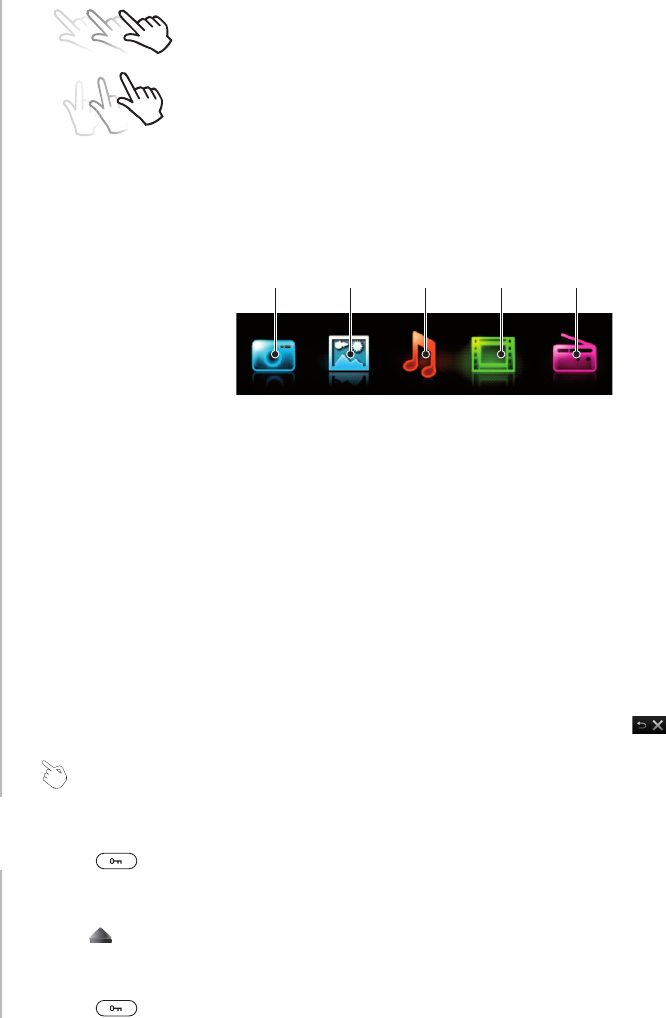
Drag Touch, hold and move an item from one place on the screen to
another.
Flick Touch and move your finger quickly left, right, up or down,
respectively.
Touch and hold Touch and let your finger remain on the item to activate it or to
have an options menu appear.
Media browser overview
1 2 3 4 5
1 Camera
2 Photo
3 Music
4 Video
5 Radio
To navigate your Media Browser
1Unlock the screen.
2Tap one of the items.
3To go back, tap on the top part of the screen or one of the Exit keys .
Using touch functionality
To activate the screen
•Press on top of the phone.
To unlock the screen
•Drag to the top of the screen.
To lock the touch functionality
•Press on the top of the phone.
9
This is an Internet version of this publication. © Print only for private use.
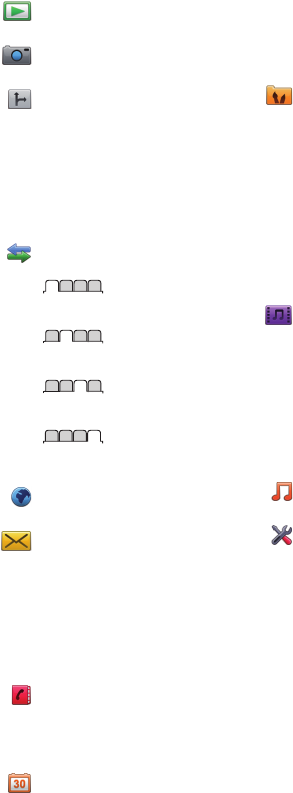
Menu overview*
PlayNow™
Camera
Location services
Google Maps
Navigation
Tracker
My favourites
Settings
Calls**
All
Answered
Dialled
Missed
Internet
Messaging
Write new
Inbox/Conversations
Messages
Email
Call voicemail
Contacts
Myself
New contact
Organiser
Alarms
Applications
Media Home
File manager **
File transfer
Calendar
Tasks
Notes
Video call
Synchronisation
Timer
Stopwatch
Torch
Calculator
Entertainment
Online services
Radio
TrackID™
Remote Play
Games
Photo Mate
Record sound
Demo tour
Media
Photo
Music
Video
Games
Web feeds
Settings
Music player
Settings
General
Profiles
Time & date
Language
Update software
Voice control
Shortcuts
Flight mode
PIN codes
Security
Accessibility
Phone status
Master reset
Sounds & alerts
Ring volume
Ringtone
Silent mode
Increasing ring
Vibrating alert
Message alert
Key sound
Display
Wallpaper
Main menu layout
Theme
Startup screen
Screen saver
Clock size
Brightness
Edit line names
Calls
Speed dial
Smart search
Divert calls
Switch to line 2
Manage calls
Time
Show/hide my no.
Handsfree
Open to answer
Close to end call
Connectivity
Wi-Fi
Bluetooth
USB
Phone name
Content sharing
Synchronisation
Device management
Mobile networks
Data communication
Internet settings
Streaming settings
Message settings
SIP settings
Accessories
User help
User guide
Settings download
Basic setup
Tips and tricks
* Some menus are operator-,
network- and subscription-
dependent.
** You can use the navigation
key to scroll between tabs in
submenus.
10
This is an Internet version of this publication. © Print only for private use.
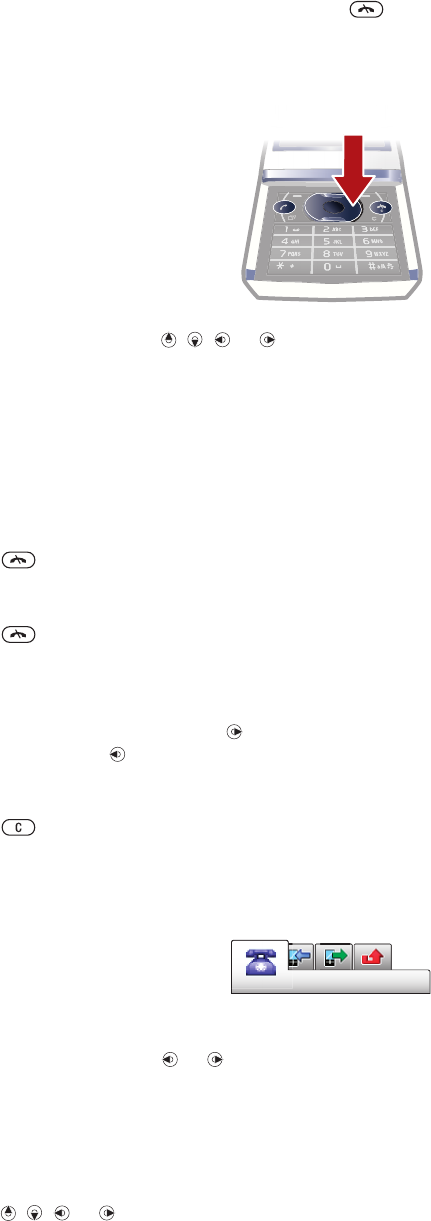
Navigation
To access the main menu
•When Menu appears on the screen, press the centre selection key to select
Menu.
•If Menu does not appear on the screen, press , and then press the centre
selection key to select Menu.
To navigate the phone menus
•Press the navigation key , , or to move through the menus.
To select actions on the screen
•Press the left, centre or right selection key.
To view options for an item
•Select Options to, for example, edit.
To end a function
•Press .
To return to standby
•Press .
To navigate your media
1Select Menu > Media.
2Scroll to a menu item and press .
3To go back, press .
To delete items
•Press to delete items such as numbers, letters, pictures and sounds.
Tabs
Tabs may be available. For example, Calls have tabs.
To scroll between tabs
•Press the navigation key or .
Shortcuts
You can use the navigation key shortcuts to go directly to functions from standby.
To use navigation key shortcuts
•Press , , or to go directly to a function.
11
This is an Internet version of this publication. © Print only for private use.
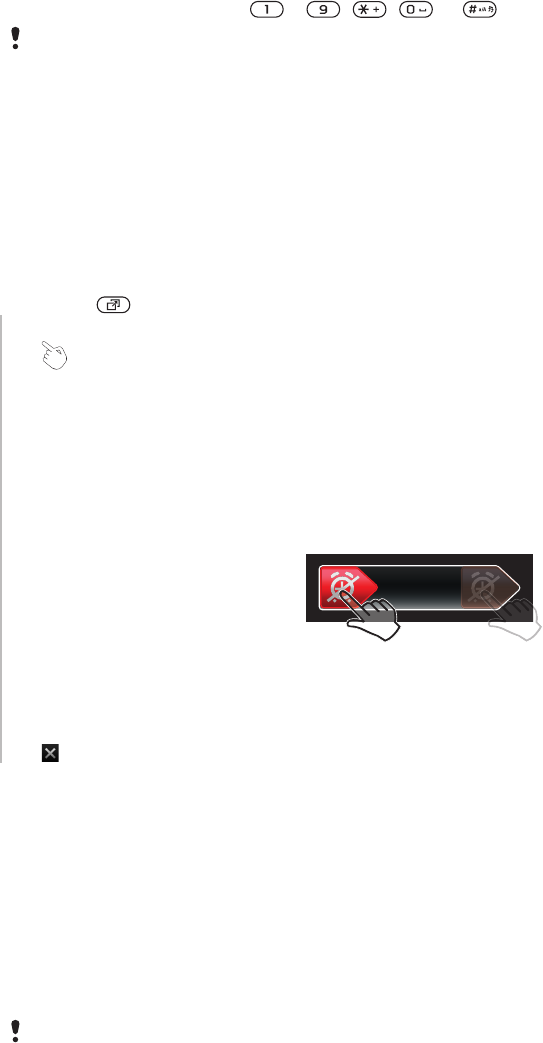
To edit a navigation key shortcut
1Select Menu > Settings > General > Shortcuts.
2Scroll to an option and select Edit.
3Scroll to a menu option and select Shortc..
Main menu shortcuts
Menu numbering starts from the top left icon and moves across and then down row by
row.
To go directly to a main menu item
•Select Menu and press – , , or .
The Main menu layout must be set to Grid. See To change the main menu layout on page 63.
Activity menu
The activity menu gives you quick access to:
•New events – missed calls and new messages.
•Running apps – applications that are running in the background.
•My shortcuts – add your favourite functions to access them quickly.
•Internet – quick access to the Internet.
To open the activity menu
•Press .
Alerts and notifications
You can handle alarm alerts and get notifications of, for example, incoming messages and
calendar events. When you dismiss a notification, you can view it later in the Activity menu.
To turn off or snooze an alarm
When the alarm is ringing:
•To turn off the alarm, drag the alarm icon to the right.
•To snooze the alarm, tap Snooze.
To dismiss a notification
•When you get a notification of an incoming email message or a calendar event, tap
.
Memory
You can save content on the memory card, in the phone memory and on the SIM card.
Photos and music are saved on the memory card, if a memory card is inserted. If not, or if
the memory card is full, photos and music are saved in the phone memory. Messages and
contacts are saved in the phone memory, but you can choose to save them on the SIM
card.
Memory card
You may have to purchase a memory card separately.
Your phone supports a microSD™ memory card adding more storage space to your
phone. It can also be used as a portable memory card with other compatible devices.
You can move content between a memory card and the phone memory.
12
This is an Internet version of this publication. © Print only for private use.
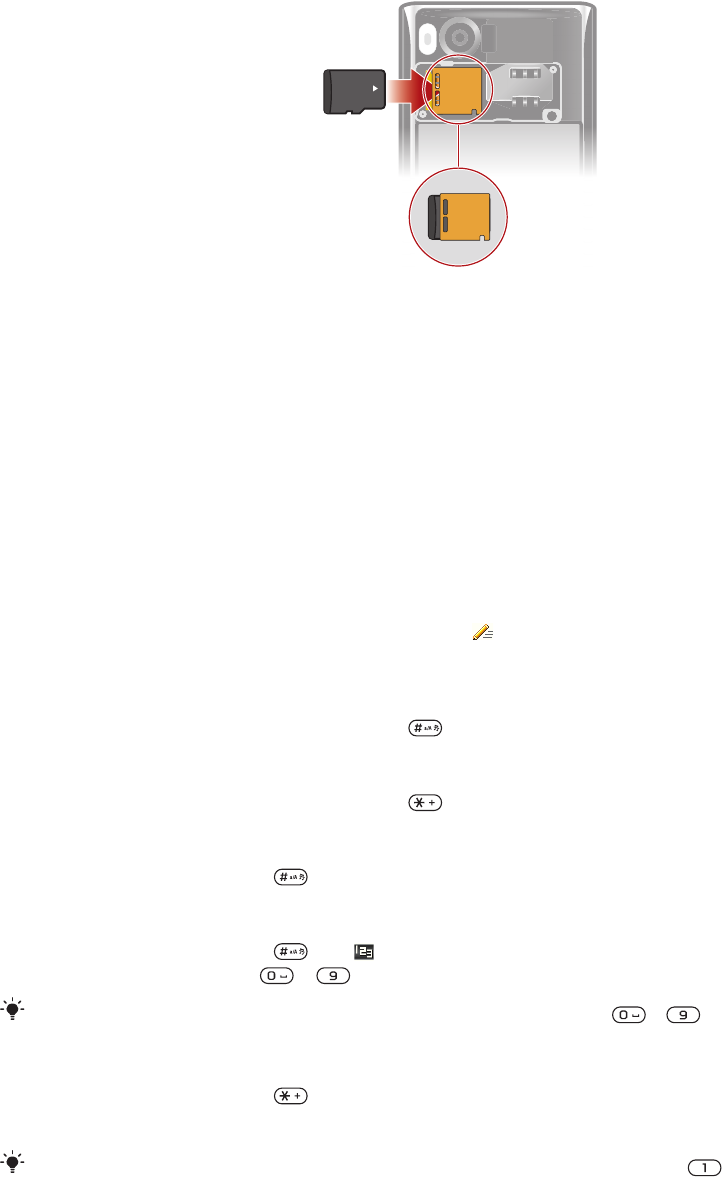
To insert a memory card
•Remove the battery cover and insert the memory card with the gold-coloured
contacts facing down.
Phone language
You can select a language to use in your phone.
To change the phone language
1Select Menu > Settings > General > Language > Phone language.
2Select an option.
Entering text
You can use multitap text input or Quick text input to enter text. The Quick text input
method uses a dictionary application in your phone.
To change the writing language
•When you enter text, press and hold down .
To change the text input method
•When you enter text, press and hold down .
To shift between upper- and lower-case letters or numbers
•When you enter text, press .
To enter numbers
1When you enter text, press until appears at the top of the screen.
2To enter a number, press – .
To enter a number from text input mode, you can press and hold down – .
To enter punctuation marks and symbols
1When you enter text, press briefly.
2Scroll to a symbol and select Insert.
To select from the most commonly used punctuation marks, you can also press .
13
This is an Internet version of this publication. © Print only for private use.
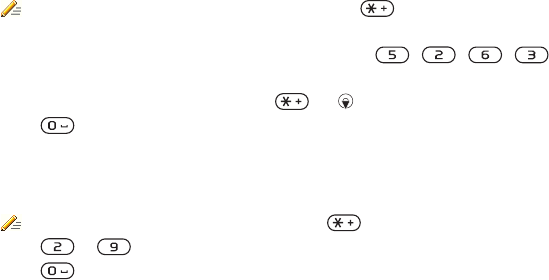
To enter text using Quick text input
1Select, for example, Menu > Messaging > Write new > Message.
2If is not displayed, press and hold down to change to Quick text input.
3Press each key only once, even if the letter you want is not the first letter on the key.
For example, to write the word “Jane”, press , , , . Write the whole
word before looking at the suggestions.
4To view word suggestions, press or .
5Press to accept a suggestion and add a space.
To enter text using the multitap method
1Select, for example, Menu > Messaging > Write new > Message.
2If is displayed, press and hold down to change to multitap text input.
3Press – repeatedly until the desired letter appears.
4Press to add a space.
To add words to the phone dictionary
1When you enter text using Quick text input, select Options > Spell word.
2Write the word using multitap input and select Save.
14
This is an Internet version of this publication. © Print only for private use.
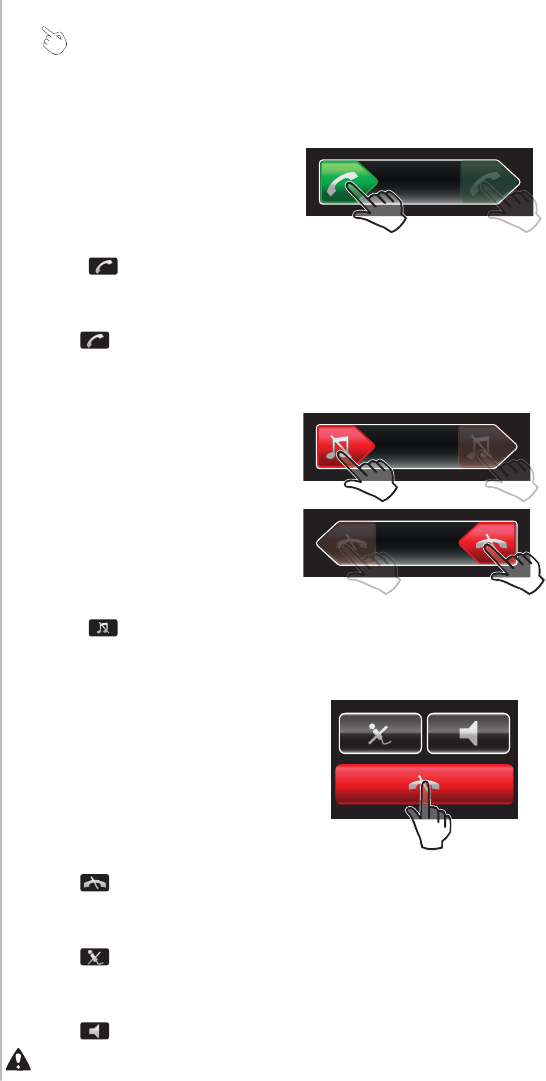
Calling
You need to turn on your phone and be within range of a network.
Making and answering calls
Answering calls
You can answer calls without opening the phone.
To answer a call when screen lock is on
•Drag from left to right.
To answer a call when screen lock is off
•Tap .
To reject a call when screen lock is on
•Drag to the right and then to the left.
To reject a call when screen lock is off
•Tap .
To mute the microphone during a call
•Tap .
To turn on a loudspeaker during a call
•Tap .
Do not hold your phone to your ear when using the loudspeaker. This could damage your hearing.
15
This is an Internet version of this publication. © Print only for private use.
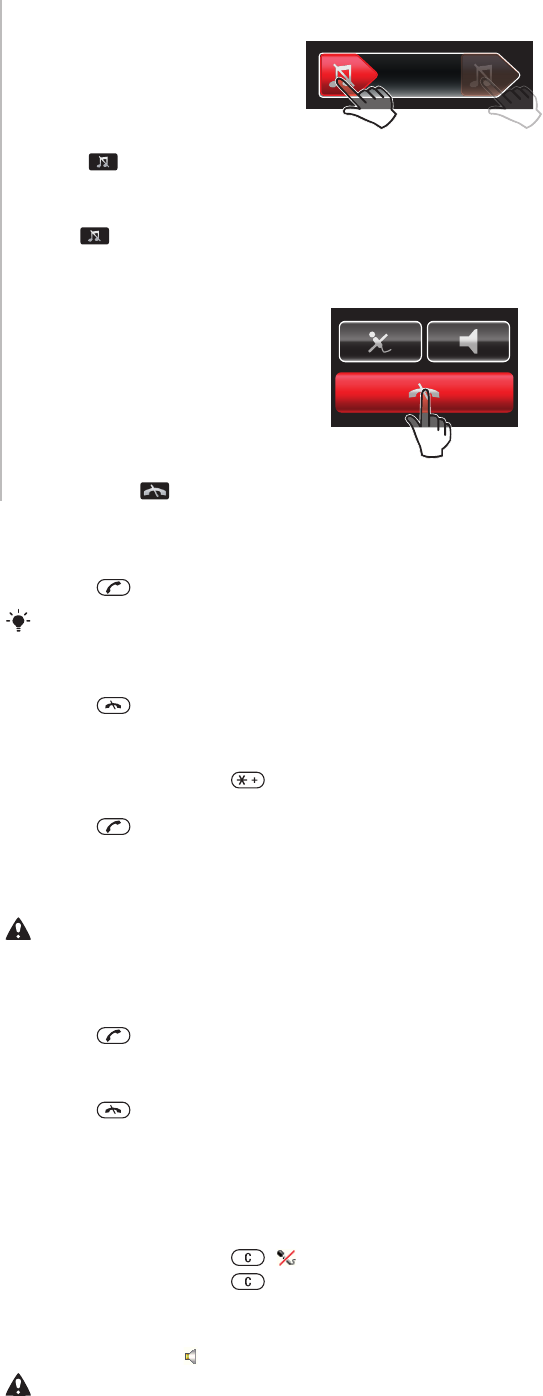
To turn off the ringtone before answering a call when screen lock is on
•Drag to the right.
To turn off the ringtone before answering a call when screen lock is off
•Tap .
To end a call
•Tap on the icon.
To make a call
1Enter a phone number (with international country code and area code, if applicable).
2Press .
You can call numbers from your contacts and call list.
To end a call
•Press .
To make international calls
1Press and hold down until a “+” sign appears.
2Enter the country code, area code (without the first zero) and phone number.
3Press .
To re-dial a number
•When Retry? appears select Yes.
Do not hold your phone to your ear when waiting. When the call connects, your phone gives a
loud signal.
To answer a call
•Press .
To reject a call
•Press .
To change the ear speaker volume during a call
•Press the volume key up or down.
To mute the microphone during a call
1Press and hold down . appears.
2Press and hold down again to resume.
To turn on the loudspeaker during a call
•Select Spkr on. appears.
Do not hold the phone to your ear when using the loudspeaker. This could damage your hearing.
16
This is an Internet version of this publication. © Print only for private use.

To view missed calls from standby
• appears. Press to open the call list.
Video call
During a video call, you can share video from the main camera.
Before making video calls
3G (UMTS) service is available when or appears. To make a video call, both parties
on the call must have a 3G (UMTS) phone subscription that supports 3G (UMTS) service
and 3G (UMTS) coverage.
To make a video call
1Enter a phone number (with international country code and area code, if applicable).
2Select Options > Make video call.
To use the zoom with an outgoing video call
•Press or .
To share photos and videos during a video call
1During a video call, press to switch to the video share mode tab.
2Scroll to a video clip or photo and select Share.
To view video call options
•During the call, select Options.
Emergency calls
Your phone supports international emergency numbers, for example, 112 or 911. You can
normally use these numbers to make emergency calls in any country, with or without the
SIM card inserted, if you are within range of a network.
In some countries, other emergency numbers may also be promoted. Your network operator may
therefore have saved additional local emergency numbers on the SIM card.
To make an emergency call
•Enter 112 (the international emergency number) and press .
To view your local emergency numbers
1Select Menu > Contacts.
2Scroll to New contact and select Options > Special numbers > Emergency
numbers.
Networks
Your phone switches automatically between GSM and (UMTS) or networks
depending on availability. Some network operators allow you to switch networks manually.
To switch networks manually
1Select Menu > Settings > Connectivity > Mobile networks > GSM/3G
networks.
2Select an option.
Call list
You can view information about answered , dialled and missed or rejected calls.
To call a number from the call list
1Press and scroll to a tab.
2Scroll to a name or a number and press .
17
This is an Internet version of this publication. © Print only for private use.

Contacts
You can save names, phone numbers and personal information in Contacts. Information
can be saved in the phone memory or on the SIM card.
You can synchronise your contacts using the Sony Ericsson PC Suite.
Default contacts
You can choose which contact information is shown as default. If Phone contacts is
selected as default, your contacts show all the information saved in Contacts. If you select
SIM contacts as default, your contacts show names and numbers saved on the SIM card.
To select default contacts
1Select Menu > Contacts.
2Scroll to New contact and select Options > Advanced > Default contacts.
3Select an option.
Phone contacts
Phone contacts can contain names, phone numbers and personal information. They are
saved in the phone memory.
To add a phone contact
1Select Menu > Contacts.
2Scroll to New contact and select Add.
3Enter the name and select OK.
4Scroll to New number: and select Add.
5Enter the number and select OK.
6Select a number option.
7Scroll between the tabs and add information to the fields.
8Select Save.
Calling contacts
To call a contact
1Select Menu > Contacts.
2Scroll to a contact and press .
To go directly to the contacts list
•Press and hold down – .
To call with Smart search
1Press – to enter a sequence of (at least two) digits. All entries which match
the sequence of digits or corresponding letters are shown in a list.
2Scroll to a contact or a phone number and press .
To turn on or off Smart search
1Select Menu > Settings > Calls > Smart search.
2Select an option.
18
This is an Internet version of this publication. © Print only for private use.

Editing contacts
To add information to a phone contact
1Select Menu > Contacts.
2Scroll to a contact and select Options > Edit contact.
3Scroll between the tabs and select Add or Edit.
4Select an option and an item to add or edit.
5Select Save.
If your subscription supports Calling Line Identification (CLI) service, you can assign personal
ringtones and pictures to contacts.
To copy names and numbers to phone contacts
1Select Menu > Contacts.
2Scroll to New contact and select Options > Advanced > Copy from SIM.
3Select an option.
To copy names and numbers to the SIM card
1Select Menu > Contacts.
2Scroll to New contact and select Options > Advanced > Copy to SIM.
3Select an option.
When you copy all contacts from your phone to the SIM card, all existing SIM card information
is replaced.
To automatically save names and phone numbers on the SIM card
1Select Menu > Contacts.
2Scroll to New contact and select Options > Advanced > Auto save on SIM.
3Select an option.
To save contacts on a memory card
1Select Menu > Contacts.
2Scroll to New contact and select Options > Advanced > Back up to m. card.
SIM contacts
SIM contacts can contain names and numbers only. They are saved on the SIM card.
To add a SIM contact
1Select Menu > Contacts.
2Scroll to New contact and select Add.
3Enter the name and select OK.
4Enter the number and select OK.
5Select a number option and add more information, if available.
6Select Save.
Deleting contacts
To delete all contacts
1Select Menu > Contacts.
2Scroll to New contact and select Options > Advanced > Delete all contacts.
3Select an option.
Contact memory status
The number of contacts you can save in your phone or on the SIM card depends on
available memory.
To view contact memory status
1Select Menu > Contacts.
2Scroll to New contact and select Options > Advanced > Memory status.
19
This is an Internet version of this publication. © Print only for private use.

Myself
You can enter information about yourself and, for example, send your business card.
To enter Myself information
1Select Menu > Contacts.
2Scroll to Myself and select Open.
3Scroll to an option and edit the information.
4Select Save.
To add your own business card
1Select Menu > Contacts.
2Scroll to Myself and select Open.
3Scroll to My contact info and select Add > Create new.
4Scroll between the tabs and add information to the fields.
5Enter the information and select Save.
Groups
You can create a group of phone numbers and email addresses from Phone contacts to
send messages to. You can also use groups (with phone numbers) when you create
accepted callers lists.
To create a group of numbers and email addresses
1Select Menu > Contacts.
2Scroll to New contact and select Options > Groups.
3Scroll to New group and select Add.
4Enter a name for the group and select Continue.
5Scroll to New and select Add.
6For each contact phone number or email address you want to mark, scroll to it and
select Mark.
7Select Continue > Done.
Speed dial
Speed dialling lets you select nine contacts that you can dial quickly from standby. The
contacts can be saved in positions 1-9.
To add contacts to speed dial numbers
1Select Menu > Contacts.
2Scroll to New contact and select Options > Speed dial.
3Scroll to a position number and select Add.
4Select a contact.
To speed dial
•Enter the position number and press .
More calling features
Voicemail
If your subscription includes an answering service, callers can leave a voicemail message
when you cannot answer a call.
To enter your voicemail number
1Select Menu > Messaging > Messages > Settings > the Message settings tab
> Voicemail number.
2Enter the number and select OK.
To call your voicemail service
•Press and hold down .
20
This is an Internet version of this publication. © Print only for private use.

Voice control
By creating voice commands you can:
•Voice dial – call someone by saying their name
•Answer and reject calls when you use a handsfree
To record a voice command using voice dialling
1Select Menu > Settings > General > Voice control > Voice dialling > Activate.
2Select Yes > New voice command and select a contact. If the contact has more
than one number, select the number to add the voice command to.
3Record a voice command such as “John mobile.”
4Follow the instructions that appear. Wait for the tone and say the command to
record. The voice command is played back to you.
5If the recording sounds OK, select Yes. If not, select No and repeat steps 3 and 4.
Voice commands are saved in the phone memory only. They cannot be used in another phone.
To voice dial
1Press and hold down a volume key.
2Wait for the tone and say a recorded name, for example “John mobile.” The phone
plays the name back to you and connects the call.
To activate voice answering and record voice answer commands
1Select Menu > Settings > General > Voice control > Voice answer > Activate.
2Follow the instructions that appear and select Continue. Wait for the tone and say
“Answer”, or say any other word.
3Select Yes to accept or No for a new recording.
4Wait for the tone and say “Busy”, or say any other word.
5Select Yes to accept or No for a new recording.
6Follow the instructions that appear and select Continue.
7Select the environments in which you want to activate voice answering.
To answer a call using voice commands
•Say “Answer.”
To re-record a voice command
1Select Menu > Settings > General > Voice control > Voice dialling > Edit
names.
2Scroll to a command and select Options > Replace voice.
3Wait for the tone and say the command.
Diverting calls
You can divert calls, for example, to an answering service.
When Restrict calls is used, some divert call options are not available.
To divert calls
1Select Menu > Settings > Calls > Divert calls.
2Select a call type and a divert option.
3Select Activate. appears.
4Enter the number to divert calls to and select OK.
Call waiting
You will hear a beep if you receive a second call while call waiting is active.
To activate call waiting
•Select Menu > Settings > Calls > Manage calls > Call waiting > Activate.
21
This is an Internet version of this publication. © Print only for private use.

More than one call
You can handle more than one call at a time. For example, you can put an ongoing call on
hold, while you make or answer a second call. You can also switch between the two calls.
You cannot answer a third call without ending one of the first two calls.
To switch between two calls
•During the call, press .
To join two calls
•During the call, select Options > Join calls.
To end an ongoing call and return to the call on hold
•First press and then .
To make a second call
1During the call, press . This puts the ongoing call on hold.
2Select Options > Add call.
3Enter the number to call and press .
To answer a second call
•During the call, press . This puts the ongoing call on hold.
To reject a second call
•During the call, press and continue with the ongoing call.
To end an ongoing call and answer a second call
•During the call, select Replace active call.
Conference calls
With a conference call, you can have a joint conversation with up to five people.
To add a new participant
1During the call, press . This puts the joined calls on hold.
2Select Options > Add call.
3Enter the number to call and press .
4Select Options > Join calls to add the new participant.
5Repeat this task to add more participants.
To release a participant
1Select Options > Release party.
2Select the participant to release.
To have a private conversation
1During the call, select Options > Talk to and select the participant to talk to.
2To resume the conference call, select Options > Join calls.
My numbers
You can view, add and edit your own phone numbers.
To check your phone numbers
1Select Menu > Contacts.
2Scroll to New contact and select Options > Special numbers > My numbers.
3Select an option.
Accept calls
You can choose to receive calls from certain phone numbers only.
22
This is an Internet version of this publication. © Print only for private use.

To add numbers to the accepted callers list
1Select Menu > Settings > Calls > Manage calls > Accept calls > Only from list.
2Scroll to New and select Add.
3Select a contact or Groups.
To accept all calls
•Select Menu > Settings > Calls > Manage calls > Accept calls > All callers.
Restricted dialling
You can restrict outgoing and incoming calls. A password from your service provider is
required.
If you divert incoming calls, you cannot use some restrict calls options.
Restrict calls options
Standard options are:
•All outgoing – all outgoing calls
•Outgoing intl – all outgoing international calls
•Outgoing intl roam. – all outgoing international calls except to your home country
•All incoming – all incoming calls
•Inc. when roaming – all incoming calls when you are abroad
To restrict calls
1Select Menu > Settings > Calls > Manage calls > Restrict calls.
2Select an option.
3Select Activate.
4Enter your password and select OK.
Call time and cost
During a call, the phone shows how long you have been talking. You can also check on
the duration of your last call, your outgoing calls and the total time of all your calls.
To check the call time
•Select Menu > Settings > Calls > Time > Call timers.
Showing or hiding your phone number
You can decide to show or hide your phone number when you make a call.
To hide your phone number
1Select Menu > Settings > Calls > Show/hide my no..
2Select Hide number.
23
This is an Internet version of this publication. © Print only for private use.

Imaging
You have to use the camera when the phone is closed. You can take photos and record
videos to view, save or send. When the phone is closed, you can find saved photos and
videos in or . When the phone is open, you can find saved photos and videos in
Media and in File manager.
To activate the camera
•Tap .
Using the still camera
To take a photo by tapping the screen
1Activate the camera.
2If the still camera is not selected, tap .
3Tap .
4Tap a spot in the viewfinder where you want the focus to be. The photo is taken as
soon as focus is set. The photo is automatically saved.
5To return to the viewfinder and to take another photo, press .
To take a photo using the shutter key
1Activate the camera.
2If the still camera is not selected, tap .
3Tap .
4Press halfway down to use auto focus. When the dot and focus frame are green,
press fully down to take a photo. The photo is saved automatically.
5To return to the viewfinder and to take another photo, press .
To use zoom
•Press the volume key.
To select still camera settings
1Activate the camera.
2If the still camera is not selected, tap .
3Tap .
4Tap the lower part of the screen to display the settings bar.
Face detection
You can use face detection to bring an off-centre face into focus. The camera automatically
detects up to three faces, indicated by white frames. A green frame shows which face has
been selected for focus. Focus is set to the face closest to the camera.
To use Face detection
1Activate the camera.
2If the still camera is not selected, tap .
3Tap .
4Tap the lower part of the screen to display the settings bar.
5Tap and then .
6Tap the screen to take the photo. The photo is taken as soon as focus is set. The
photo is saved automatically.
7To return to the viewfinder and to take another photo, press .
Photo fix
You can use Photo fix to improve a photo you have taken. In a one-tap operation,
brightness, light and contrast are adjusted to give you the best possible photo. The
improvements are saved as a copy of the photo. The original photo is not affected.
24
This is an Internet version of this publication. © Print only for private use.

To improve a photo with Photo fix
1Take a photo.
2During review, tap the screen to display the toolbar.
3Tap .
4Tap .
5Review the improvement and tap to save.
6If you do not want to save the improvement select .
You can apply Photo fix on a photo several times.
Still camera settings
Icon Setting Description
Scenes Use Scenes to quickly set up the camera for common
situations using pre-programmed scenes. The camera
has determined a number of settings for you to fit the
selected scene, ensuring the best possible photo.
Auto The camera automatically adjusts settings for a photo.
Portrait Use for portrait photos. Face detection is turned on.
Settings are optimised to give slightly softer skin tones.
Twilight portrait Use for portrait photos at night or in poorly lit
environments (with or without the flash). Due to long
exposure time, the camera must be held still or placed on
a stable surface.
Sports Use for photos of fast-moving objects. Short exposure
time minimises motion blurring.
Snow & beach Use in bright environments to avoid underexposed
photos.
Landscape Use for landscape photos. The camera focuses on
distant objects. The flash is turned off.
Twilight landscape Use when taking landscape photos at night or in poorly
lit environments (without the flash). Due to long exposure
time, the camera must be held still or placed on a stable
surface.
Document Use for photos of text or drawings. It gives the photo
increased and sharper contrast.
Focus Focus controls which part of a photo should be sharp.
Auto The camera automatically focuses on the selected
subject. The white focus frame turns green when focus
is set.
Face detection The camera automatically detects up to three human
faces, indicated by white frames. A green frame shows
which face has been selected when auto focus is used.
Focus is set on the face closest to the camera. Face
detection cannot be used for all scene types.
Macro Auto focus for extreme close-up photos.
Infinite Use when taking photos at a distance. Focus is set on
subjects far away. Subjects close to the camera may be
blurred.
Flash Use the flash to take photos when lighting conditions are
poor.
Auto The flash will automatically fire when lighting conditions
are poor.
Off The flash never goes off, regardless of lighting conditions.
Sometimes photo quality can be better without a flash,
even if lighting conditions are poor. Taking a good photo
without using the flash requires a steady hand. You can
use the self-timer to avoid a blurred photo.
Self-timer With the self-timer you can take a photo without holding
the phone. Use it to take self-portraits, or group photos
25
This is an Internet version of this publication. © Print only for private use.

where everyone can be in the photo. You can also use
the self-timer to avoid shaking the camera when taking
photos.
On, 10s Sets a 10-second delay from when the shutter key is
pressed until the photo is taken.
On, 2s It can be hard to hold the phone perfectly still when
pressing the shutter key, which may result in a blurred
photo. Use the 2-second delay to solve this problem.
Off The photo is taken as soon as you press the shutter key.
Picture size You can select between several picture sizes and aspect
ratios before taking a photo. Note that a photo with a
higher resolution requires more memory.
8MP 8 megapixel picture size with 4:3 aspect ratio. Suitable
for photos you want to view on non-widescreen displays
or print in high resolution.
7MP 7 megapixel picture size with 3:2 aspect ratio. This is the
ratio used for traditional photos. Printed photos will fit
most frames and photo albums.
6MP 6 megapixel picture size with 16:9 aspect ratio. A high
resolution widescreen format. Has a higher resolution
than full HD. Suitable for photos you want to view on
widescreen displays.
3MP 3 megapixel picture size with 4:3 aspect ratio. Suitable
for photos you want to view on non-widescreen displays.
Full HD Full high-definition format with 1920×1080 pixels.
Suitable for photos you want to view on a widescreen HD
TV.
Add geotags You can tag photos with details of where you took them.
Show friends and family where you were on a map, or
use geotags to find your way back to the location another
time.
Off When turned off, you are not able to view the location of
where you took a photo on a map.
On When turned on, the approximate geographical location
is added to photos when you take them. This information
can later be used to identify the location where the photo
was taken. You can view your photos on a map in
Media > Photo.
Tips on using the camera
Rule of thirds
Don’t place your subject in the middle of the frame. By placing it a third of the way in, you
achieve a better result.
Hold it steady
Avoid blurry photos by holding the camera steady. Try to steady your hand by leaning it
against a solid object. You can also use the self-timer to make sure that the phone is steady
when the photo is taken.
Get closer
By getting as close as possible to your subject, you won’t have to rely on the zoom. Try to
fill the viewfinder with your subject.
Stay within the flash range
Photos taken beyond the maximum flash range will be too dark. The maximum flash range
is about four steps from the subject.
Consider variety
Think about different angles, move towards the object. Take some vertical photos. Try
different positions.
Use a plain background
A plain background helps highlight your subject.
26
This is an Internet version of this publication. © Print only for private use.

Keep your lens clean
Mobile phones are used in all kinds of weather and places, and carried in pockets and bags.
This results in the camera lens becoming dirty and covered with fingerprints. Use a soft
cloth to clean the lens.
Using the video camera
To record a video by tapping the screen
1Activate the camera.
2If the video camera is not selected, tap .
3Tap .
4To start recording, tap the screen.
5To pause the recording, tap . To continue recording, tap .
6To stop recording, tap . The video is saved automatically.
7To return to the viewfinder and to record another video, tap .
To record a video using the shutter key
1Activate the camera.
2If the video camera is not selected, tap .
3Tap .
4Press to start recording.
5To stop recording, press . The video is saved automatically.
6To return to the viewfinder and to record another video, press .
To select video camera settings
1Activate the camera.
2If the video camera is not selected, tap .
3Tap .
4Tap the lower part of the screen to display the settings bar.
Video camera settings
Icon Setting Description
Video format Select the size and
aspect ratio of a video
before you record it.
nHD 640x352 pixels video
size with 16:9 aspect
ratio. A widescreen
format suitable for
videos you want to view
on widescreen displays.
VGA 640x480 pixels video
size. Standard video
format for video cameras
and computer screens.
Message Record videos suitable
for sending in multimedia
messages. The
recording time of this
video format is limited to
fit in a multimedia
message.
Night mode Use when lighting
conditions are poor.
On When turned on, light
sensitivity is increased.
Use in poorly lit
environments. Videos of
fast-moving objects may
get blurred. Hold your
27
This is an Internet version of this publication. © Print only for private use.

hand steady, or use a
support.
Off Turn off night mode
when lighting conditions
are good, to improve the
video quality.
Light Select whether you want
to use the light when you
record a video.
On Turn on the light to
improve close-up videos
in poorly lit
environments.
Off The light is always turned
off regardless of lighting
conditions. Note:
Sometimes a video gets
better without the light,
even if lighting
conditions are poor. To
record a good-quality
video without using the
light requires a steady
hand. You can also use
a support and the self-
timer to avoid a blurred
video.
Microphone Select whether to pick
up the surrounding
sound when recording
videos.
Off When turned off, no
sound is recorded with
the video.
On When turned on, sound
is recorded with the
video.
Self-timer With the self-timer you
can record a video
without holding the
phone. Use it to record a
video where everyone
can be in it. You can also
use the self-timer to
make sure that the
phone is steady when
the video is recorded.
On, 10s Sets a 10-second delay
from when the shutter
key is pressed until the
video recording starts.
On, 2s It can be hard to hold the
phone perfectly still
when pressing the
shutter key, which may
result in a blurred video.
Use the 2-second delay
to solve this problem.
Off When the self-timer is
off, the video recording
starts as soon as you
press the shutter key.
Image stabiliser Compensates for small
movements of the hand
to avoid blurred videos.
On The recommended
setting. Use to avoid
blurred videos.
28
This is an Internet version of this publication. © Print only for private use.

Off
Working with photos
You can view, enhance and organise photos and videos on your computer by installing the
Adobe™ Photoshop™ Album Starter Edition. It is available for download at
www.sonyericsson.com/support.
Use theMedia Go™ application to transfer content to and from your phone. For more
information, see Transferring content to and from a computer on page 42.
Editing photos
To delete a photo
1Tap .
2Flick through the photos and videos.
3Select a photo.
4Tap the photo to view the tool bar.
5Tap to delete a photo.
To edit a photo
1Tap .
2Flick through the photos and videos.
3Select a photo.
4Tap the photo to view the tool bar.
5Tap
6Tap to apply black and white.
7Tap to apply Photo fix.
To zoom a photo
1Tap
2Flick through the photos and videos.
3Select a photo.
4Tap the photo to view the tool bar.
5Tap .
6Drag to zoom the photo.
Viewing photos on a map
When you take a photo, you can attach your geographical position to it. This is called geo
tagging. Geo-tagged photos are tagged with in Media. If you cannot view photos on a
map, see I cannot use Internet-based services on page 71.
To view photos on a map
1Select Menu > Media > Photo > Camera album.
2Select a month.
3Scroll to a photo and select View.
4Select Options > View on map.
To turn on or off geo tagging
1Activate the camera.
2If the still camera is not selected, tap .
3Tap .
4Tap the lower part of the screen to display the settings bar.
5Tap or
6Tap an option.
Photo tags
You can organise your photos with photo tags. You can create new tags, assign one or
several tags to a photo, or remove a tag from a photo. Photos with the same tag are put
29
This is an Internet version of this publication. © Print only for private use.

together under Photo tags. For example, you can add tag "Vacation" to all your vacation
photos, and view them all in Photo tags, under the tag "Vacation".
To create a new photo tag
1Select Menu > Media > Photo > Camera album.
2Select a month.
3Scroll to a photo and select View.
4Press and select Options > Tag this photo.
To tag photos
1Select Menu > Media > Photo > Camera album.
2Select a month.
3Scroll to a photo and select View.
4Press and scroll to a tag.
5Select Options > Tag this photo.
6For each photo you want to tag, scroll to the photo and select Options > Tag this
photo.
To delete a tag from a photo
1When viewing a photo, press .
2Scroll to a tag and select Options > Delete tag.
Viewing and tagging photos
To view photos and videos using the camera
1Activate the camera.
2Tap .
3Tap .
4Flick through your photos and videos. Tap the screen to display controls.
5Videos are indicated by . Tap to play a video.
To view photos and videos in the media browser
1Tap .
2Flick through the photos and videos.
3Tap a photo or a video.
To view photos in a slide show
1Select Menu > Media > Photo > Cam. album.
2Select a month.
3Scroll to a photo and select View.
4Select Options > Slide show.
5Select a mood.
Using photos
You can add a photo to a contact, use the photo during phone startup, as a wallpaper in
standby or as a screen saver.
To use photos
1Select Menu > Media > Photo > Camera album.
2Select a month.
3Scroll to a photo and select View.
4Select Options > Use as.
5Select an option.
Sharing photos and videos
You can take a picture or video, or view a picture or a video, and send it to another phone
or to the web.
30
This is an Internet version of this publication. © Print only for private use.

To send a photo or a video saved in the phone
1Tap .
2Select a photo or a video.
3Tap the screen.
4Tap .
5Select To web albums, As message, As email or Via Bluetooth.
6Open the phone.
7Enter a recipient and select Send.
To send a photo or a video you have just captured
1When you have captured a photo or a video, tap .
2Select To web albums, As message, As email or Via Bluetooth.
3Open the phone.
4Enter a recipient and select Send.
Using web albums
If your subscription supports this service, you can send photos or videos to a web album.
If you cannot send content to a web album, see I cannot use Internet-based services on
page 71.
Web services may require a separate license agreement between you and the service provider.
Additional regulations and charges may apply. Contact your service provider for more
information.
To send photos saved in your phone to a web album
1Select Menu > Media > Photo > Cam. album.
2Select a month and year.
3Scroll to the photo and select Options > Send > To web albums.
4Select a web album service. If requested, enter your login information.
5Select an album, or add a new album.
6Enter text and select Send.
To send videos saved in your phone to a web album
1Select Menu > Media > Video > Videos.
2Scroll to a video and select Options > Send > To web albums.
3Select a web album service. If requested, enter your login information.
4Select a web album, or add a new web album.
5Enter some text and select Send.
To view web albums
1Select Menu > Media > Photo > Web albums.
2Select a web album.
To go to a Web address from contacts
1Select Menu > Contacts.
2Scroll to a contact and select Open.
3Scroll to a Web address and select Go to.
Printing photos
You can print photos using a USB cable connected to a PictBridge™ compatible printer.
You can also print using a Bluetooth compatible printer that supports the Object Push Profile.
31
This is an Internet version of this publication. © Print only for private use.

To print photos using a USB cable
1Select Menu > Organiser > File manager > Camera album > Open.
2Select Options > Mark > Mark several or Mark all.
3Select Options > Print and follow the instructions.
4Connect the USB cable to the phone.
5Connect the USB cable to the printer.
6Wait for feedback in the phone.
7Set printer settings if required and select Print.
Disconnect and re-connect the USB cable if there is a printer error.
Accessing videos in your phone
When the phone is closed, you can browse and play videos using the video player in the
media browser. You can find videos you recorded using the camera under Camera
album. You can access other videos from Videos. When the phone is open, you can
access your videos from Media and File manager. For more information about how to
handle content in File manager, go to www.sonyericsson.com/support and download the
Managing content Feature guide.
To play videos
1Tap .
2Tap a category.
3Flick left or right to browse through your videos.
4Tap the video you want to play.
To pause videos
1Tap the screen to display the controls.
2Tap .
To fast forward and rewind videos
1Tap the screen to display the controls.
2Touch and hold or .
To move between videos
•Flick left to move to the next video, or flick right to move to the previous video.
To view a video zoomed in
1Tap the screen to display the controls.
2Tap .
To show subtitles
1Tap the screen to display the controls.
2If a video has subtitles, is displayed. Tap .
3Select a language.
To hide subtitles
1Tap the screen to display the controls.
2If a video has subtitles, is displayed. Tap .
3Tap Off.
Video player
To play videos
1Select Menu > Media > Video > Videos.
2Scroll to a title and select Play.
To stop playing videos
•Press the centre selection key.
32
This is an Internet version of this publication. © Print only for private use.

To fast forward and rewind
•Press and hold down or .
To move between videos
•Press or .
To change the volume
•Press the volume key up or down.
To change the video screen size
•Press .
33
This is an Internet version of this publication. © Print only for private use.

Music
You can listen to music, audio books and podcasts. Use the Media Go™ application to
transfer content to and from your phone. For more information, see Transferring content
to and from a computer on page 42.
Accessing music in your phone
When the phone is closed, you can browse and play music using the music player in the
media browser. More music features are available in Media and File manager, which you
can access when the phone is open.
To browse music
1Tap .
2Tap a category.
3Flick left or right to browse through your music.
4Tap an album or a playlist to view its content.
5To go back, tap outside the list and then the top part of the screen.
To browse music using the slider
1When browsing music, for example, albums, tap the lower part of the screen to
display .
2To browse your music, drag left or right.
To play music
1Tap .
2Tap a category.
3Flick left or right to browse through your music.
4Tap an album or a playlist.
5To play a track, tap the title.
To pause the music
•Tap .
To fast forward and rewind music
•Touch and hold or .
You can also drag right or left to fast forward or rewind.
To move between tracks
•Tap or .
To view the current play queue
•Tap the album art.
To minimise the music player
•Tap .
To return to the music player
•Tap in the lower part of the screen.
Playing music in random order
You can play tracks in playlists in random order. A playlist can be, for example, a playlist
you have created yourself or an album.
To play tracks in random order
•In the music player, tap .
34
This is an Internet version of this publication. © Print only for private use.
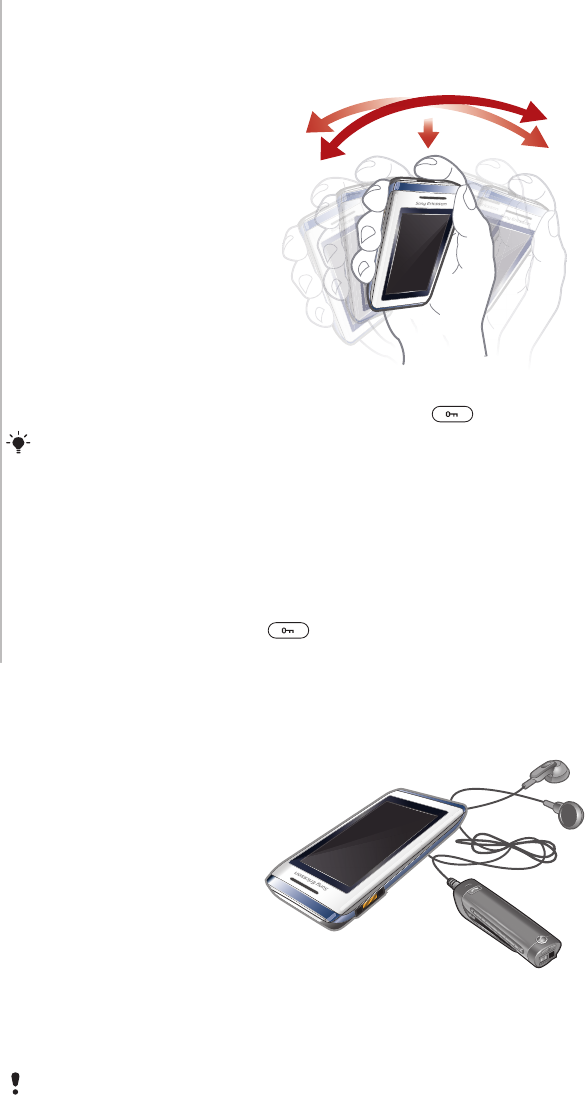
Shake control
To shuffle tracks
•When music is playing, press and hold down and shake your phone.
You can also shuffle tracks when the phone is open by shaking the phone.
Using the music mini player
You can use the music mini player for quick access to music controls when the screen lock
is on.
To activate the music mini player
1To view the screen, press on top of the phone.
2Tap the status bar at the bottom of the screen.
Stereo portable handsfree
To use a handsfree
•Connect a portable handsfree. Music stops when you receive a call and resumes
when the call has ended.
If headphones are not included with the phone, you may purchase them separately.
Music player
To play music
1Select Menu > Media > Music.
2Browse by category using the navigation key.
3Scroll to a title and select Play.
To stop playing music
•Press the centre selection key.
35
This is an Internet version of this publication. © Print only for private use.

To fast forward and rewind
•Press and hold down or .
To move between tracks
•Press or .
To change the volume
•Press the volume key up or down.
To minimise the player
•Select Options > Minimise.
To return to the player
•Select Menu > Media.
Clear stereo and clear bass
Clear stereo and clear bass are turned on when you set the equaliser manually.
To set the equaliser manually
1Select Menu > Media > Music.
2Browse by category using the navigation key.
3Scroll to a title and select Play.
4Select Options > Settings > Equaliser.
5Make sure you are in Manual view. If you are not, select Manual.
6To scroll between the frequency bands, press or .
7To change the value for a selected frequency band, press or .
8To go back to the player view, select Done.
To turn on clear stereo and clear bass using equaliser presets
1
2Select Menu > Media > Music.
3Browse by category using the navigation key.
4Scroll to a title and select Play.
5Select Options > Settings > Equaliser.
6Make sure you are in Preset view. If you are not, select Preset.
7To scroll between the presets, press or .
8Select any of the presets, except Normal.
Playlists
You can create playlists to organise your music. You can add tracks and folders to a playlist.
It may take a few minutes for the phone to create a playlist.
To create a playlist
1Select Menu > Media > Music > Playlists.
2Scroll to New playlist and select Add.
3Enter a name and select OK.
4For each track you want to add, scroll to the track and select Mark.
5Select Add to add the marked tracks to the playlist.
To add tracks to a playlist
1Select Menu > Media > Music > Playlists.
2Select a playlist.
3Scroll to Add music and select Add.
4For each track you want to add, scroll to the track and select Mark.
5Select Add to add the marked tracks to the playlist.
36
This is an Internet version of this publication. © Print only for private use.
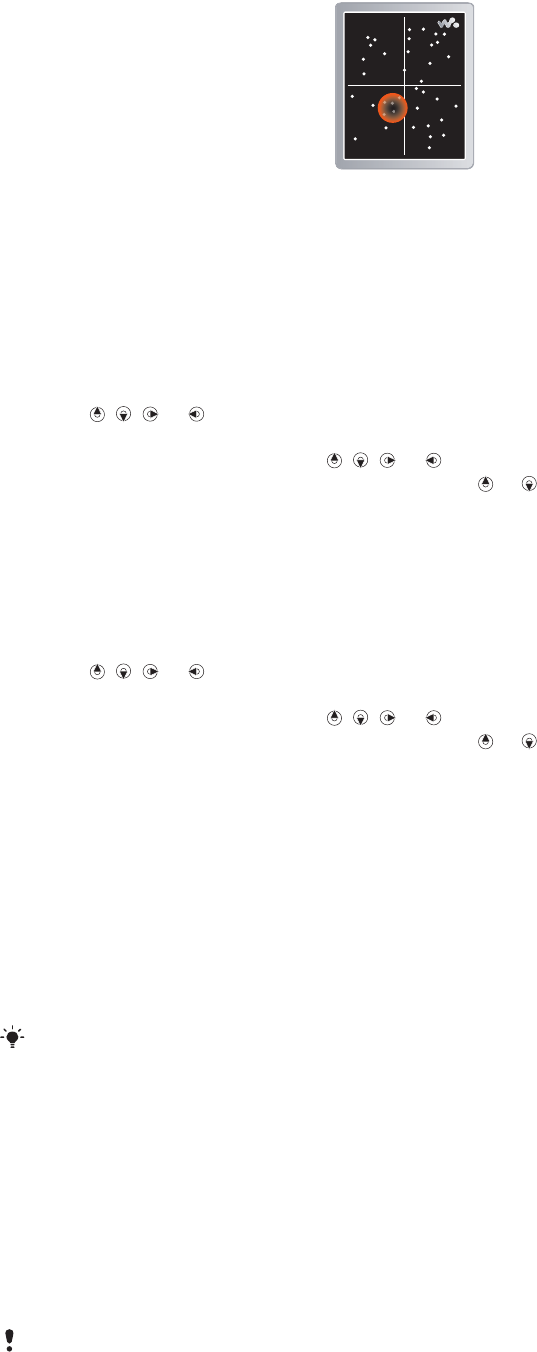
SensMe™
With SensMe™ you can create playlists in two ways, by mood or from all the tracks in your
phone. By mood, you first use Media Go™ to transfer tracks to your phone. Information
such as mood, tempo and chords is then added. The tracks are displayed as dots on a
map with two axes. In the All view, all the tracks in your phone are placed randomly on the
map.
To create a playlist by mood
1Select Menu > Media > Music.
2Scroll to SensMe™ and select Open.
3Press , , or .
4Make sure you are in Mood view. If you are not, select Mood.
5To preview different tracks, press , , or .
6To choose an area of tracks, select Add and press or .
7To create the playlist and play it in the Walkman™ player, select Create.
8Select Options > Save playlist.
9Enter a name and select OK.
To create a playlist from All view
1Select Menu > Media > Music.
2Scroll to SensMe™ and select Open.
3Press , , or .
4Make sure you are in All view. If you are not, select All.
5To preview different tracks, press , , or .
6To choose an area of tracks, select Add and press or .
7To create the playlist and play it in the Walkman™ player, select Create.
8Select Options > Save playlist.
9Enter a name and select OK.
Audio books
If you use Media Go™ to transfer audio books to your phone from a computer, you can
listen to the audio books in your phone. It may take a few minutes before a transferred
audio book appears in the list of available audio books.
To access audio books
•Select Menu > Media > Music > Audio books.
You can find audio books in formats other than M4B and those that do not have ID3v2 chapter
tags in the Tracks folder.
Buy Now
If you subscribe to a music service allowing limited, non-permanent use with your phone,
you can mark a track you are interested in buying later. The next time you synchronise your
music with Windows Media® Player on a computer with enabled Internet access, you
should be asked if you want to buy the track you marked earlier. If you accept, the track is
downloaded to your computer and your selected music service account is charged. This
service requires a subscription and account with a downloadable music service, a
computer with Microsoft® Windows Media® Player 11 or subsequent compatible version
of Windows Media® Player, and a USB computer connection.
You cannot see that a track is marked. You cannot unmark tracks you have already marked.
37
This is an Internet version of this publication. © Print only for private use.

To mark a track
•When the track you want to mark is playing, press and hold down .
PlayNow™
When you select PlayNow™ you enter PlayNow™ arena, where you can download music,
games, ringtones, themes and wallpapers. You can preview or listen to content before you
purchase and download it to your phone. If you cannot use PlayNow™ and PlayNow™
arena, see I cannot use Internet-based services on page 71.
This service is not available in all countries.
For extended functionality, you can also access the PlayNow™ arena Web shop on a
computer from www.playnow-arena.com. For more information, go to
www.sonyericsson.com/support to read the PlayNow™ arena Feature guide.
To use PlayNow™
1Select Menu > PlayNow™.
2Scroll through PlayNow™ arena and follow the instructions to preview and purchase
content.
TrackID™
TrackID™ is a music recognition service. You can search for title, artist and album name
for a track you hear playing through a loudspeaker or on the radio in your phone. If you
cannot use TrackID™, see I cannot use Internet-based services on page 71.
To search for track information
•When you hear a track through a loudspeaker, select Menu > Entertainment >
TrackID™ > Start.
•When the radio in your phone is playing select Options > TrackID™.
For best results, use TrackID™ in a quiet area.
Online music and video clips
You can view video clips and listen to music by streaming them to your phone from the
Internet. If you cannot use the Internet, see I cannot use Internet-based services on
page 71.
To select a data account for streaming
1Select Menu > Settings > Connectivity > Streaming settings > Connect using:.
2Select the data account to use.
3Select Save.
To stream music and video clips
1Select Menu > Internet.
2Select Options > Go to > Bookmarks.
3Select a link to stream from.
Radio
Do not use your phone as a radio in places where this is prohibited.
To turn on the radio
1Connect a handsfree to the phone.
2When the phone is closed, unlock the screen.
3Tap .
38
This is an Internet version of this publication. © Print only for private use.

To search for channels automatically
•Tap or .
To search for channels using the slider
•Drag through the frequency band.
To fine tune the frequency
•Tap or .
To select saved channels
1Tap .
2Tap a channel.
If is unavailable there are no channels saved. To save channels, use the radio with the phone
open.
To minimise the radio
•Tap .
To return to the radio
•Tap .
To turn off the radio
•Tap .
To turn on the radio
1Connect a handsfree to the phone.
2Select Menu > Entertainment > Radio.
To search for channels automatically
•Select Search.
To fine tune the frequency
•Press or .
To change the volume
•Press the volume key up or down.
To minimise the radio
•Select Options > Minimise.
To return to the radio
•Select Menu > Entertainment > Radio.
Saving channels
You can save up to 20 preset channels.
To save channels automatically
•Select Options > Channels > Auto save.
To save channels manually
1When you find a radio channel, select Options > Channels >Save.
2Scroll to a position and select Insert.
3If you want, you can rename the channel. Select Save.
You can also save a channel in a position by pressing and holding down - .
39
This is an Internet version of this publication. © Print only for private use.

To switch between saved channels
•Press or .
You can also select a saved channel by pressing - .
Record sound
You can record a voice memo or a call. Recorded sounds can also be set as ringtones.
In some countries or states it is required by law that you inform the other person before recording
the call.
To record a sound
1Select Menu > Entertainment > Record sound > Record.
2To stop recording and save, select Save.
To record a call
1During an ongoing call, select Options > Record.
2To save the recording, select Save.
To listen to a recording
1Select Menu > Organiser > File manager.
2Scroll to Music and select Open.
3Scroll to a recording and select Play.
40
This is an Internet version of this publication. © Print only for private use.

Transferring and handling content
You can transfer and handle content such as pictures and music.
You are not allowed to exchange some copyright-protected material. identifies a protected
item.
Handling content in the phone
You can use File manager in your phone, to handle content saved in the phone memory
or on a memory card. Tabs and icons in File manager show where the content is saved.
If the memory is full, delete some content to create space.
To view memory status
1Select Menu > Organiser > File manager.
2Select Options > Memory status.
3Select Memory card or Phone.
To select more than one item in a folder
1Select Menu > Organiser > File manager.
2Scroll to a folder and select Open.
3Select Options > Mark > Mark several.
4For each item you want to mark, scroll to the item and select Mark.
To move items between the phone memory and the memory card
1Select Menu > Organiser > File manager.
2Find an item and select Options > Manage file > Move.
3Select Memory card or Phone.
4Scroll to a folder and select Open.
5Select Paste.
To view information about content
1Select Menu > Organiser > File manager.
2Find an item and select Options > Information.
Sending content to another phone
You can send content, for example, in messages or using Bluetooth wireless technology.
To send content
1Scroll to an item and select Options > Send.
2Select a transfer method.
Make sure the receiving device supports the transfer method you select.
Using a USB cable
You can connect your phone to a computer with a USB cable. If you are using a PC, you
are asked to install PC Companion the first time you connect.
You may have to purchase a USB cable separately. Only use a USB cable supported by your
phone.
PC Companion
PC Companion lets you:
•Explore content in your phone.
•Use your phone as a modem.
•Install PC Software used to synchronise, transfer and back up phone content.
41
This is an Internet version of this publication. © Print only for private use.

For more information, go to www.sonyericsson.com/support to read Feature guides.
To download Mac compatible software, go to www.sonyericsson.com/support.
To install PC Companion
1Connect your phone to a PC using a USB cable supported by your phone.
2Computer: Follow the instructions.
To disconnect the USB cable safely
Do not disconnect the USB cable when transferring content as this may corrupt the content.
1Computer: Right-click the Safely Remove Hardware icon in Microsoft® Windows®
Explorer.
2Select the drives you want to disconnect. Select Stop.
3Wait until you are notified that it is safe to remove the drive. Disconnect the USB
cable.
Required operating systems
You need one of these operating systems to use Sony Ericsson PC software:
•Microsoft® Windows Vista™
•Microsoft® Windows® XP, Service Pack 2 or higher
Drag and drop content
You can drag and drop content between your phone, a memory card and a computer in
Microsoft Windows Explorer.
To drag and drop content
1Connect your phone to a computer using a USB cable.
2Computer: Wait until the phone memory and memory card appear as external disks
in Microsoft® Windows® Explorer.
3Drag and drop selected files between the phone and the computer.
Transferring content to and from a computer
You can use Media Go™ to transfer media content between your phone and a computer.
Media Go™ is available for download through PC Companion or from
www.sonyericsson.com/support.
To download Mac® compatible software, go to www.sonyericsson.com/support.
To transfer content using Media Go™
1Connect the phone to a computer with a USB cable supported by your phone.
2Computer: Select Start/Programs/Sony/Media Go™.
3Select Transfer to or from Device using Media Go™ and click OK.
4Wait until the phone appears in Media Go™.
5Move files between your phone and the computer in Media Go™.
Media Home
You can use Media Home to transfer content automatically from Media Go™ to your
phone. You can also use Media Home to download content from a DLNA server.
Before using Media Home, you must install Media Go™ on your computer and enable
Media sharing. Media Go™ is available for download through PC Companion or from
www.sonyericsson.com/support.
To set up Media Home
1Computer: Turn on Media Go™ and enable Media sharing.
2Phone: Start and complete the Setup wizard.
42
This is an Internet version of this publication. © Print only for private use.

To automatically transfer content to your phone from Media Go™
•Connect the phone to the charger. Media Home will start an automatic download
when a charger is connected.
To manually transfer content to your phone from Media Go™
1Select Organiser > Media Home.
2Press Start.
To browse and download content from a DLNA server
1Select Organiser > Media Home > Options > Browse.
2Select a server and mark the content you want to download.
3Press Download.
Phone name
You can enter a name for your phone that is shown to other devices when using, for
example, Bluetooth™ wireless technology.
To enter a phone name
1Select Menu > Settings > Connectivity > Phone name.
2Enter the phone name and select OK.
Using Bluetooth™ wireless technology
The Bluetooth™ function is free of charge and makes wireless connection to other
Bluetooth devices possible. You can, for example:
•Connect to handsfree devices.
•Connect to several devices at the same time.
•Connect to computers and access the Internet.
•Exchange items.
•Play multiplayer games.
A range within 10 metres (33 feet), with no solid objects in between, is recommended for
Bluetooth communication.
Before using Bluetooth wireless technology
You must turn on the Bluetooth function to communicate with other devices. You may also
have to pair your phone with other Bluetooth devices.
To turn on the Bluetooth function
•Select Menu > Settings > Connectivity > Bluetooth > Turn on.
Make sure that the device you want to pair your phone with has the Bluetooth function activated
and Bluetooth visibility turned on.
To pair the phone with another device
1Select Menu > Settings > Connectivity > Bluetooth > Add new device.
2Select a device.
3Enter a passcode, if required.
To allow connection to the phone
1Select Menu > Settings > Connectivity > Bluetooth.
2Select a device from the list.
3Select Options > Allow connection.
4Select Always ask or Always allow.
This is only possible with devices that require access to a secure service.
43
This is an Internet version of this publication. © Print only for private use.

Power saving
You can save battery power with the Power save function. In Power save mode you can
only connect with a single Bluetooth device. If you want to connect with more than one
Bluetooth device at the same time, you must turn off this function.
To turn on Power save
•Select Menu > Settings > Connectivity > Bluetooth > Options > Power save >
On.
Transferring sound to and from a Bluetooth handsfree
You can transfer sound to and from a Bluetooth handsfree using a phone key or the
appropriate key on the handsfree.
To transfer sound
1Select Menu > Settings > Connectivity > Bluetooth > Options > Incoming call.
2Select an option. In phone transfers sound to the phone. In handsfree transfers
sound to the handsfree.
You need to answer the call with the phone key for this setting to apply.
To transfer sound during a call
1During a call, select Sound.
2Select from the list of options available.
Backing up and restoring
You can back up and restore contacts, the calendar, tasks, notes and bookmarks using
the Sony Ericsson PC Suite.
Before backing up and restoring, you need to install the Sony Ericsson PC Suite, which is
available through PC Companion or from www.sonyericsson.com/support.
You can back up and restore contacts in your phone using a memory card. You can move
content between the memory card and the phone memory. See Handling content in the
phone on page 41.
Back up your phone content regularly to make sure you do not lose it.
To make a backup using the Sony Ericsson PC Suite
1Computer: Start the Sony Ericsson PC Suite from Start/Programs/Sony Ericsson/
Sony Ericsson PC Suite.
2Follow the instructions in the Sony Ericsson PC Suite on how to connect.
3Go to the backup and restore section in the Sony Ericsson PC Suite and make a
backup of your phone content.
To restore phone content using the Sony Ericsson PC Suite
The Sony Ericsson PC Suite overwrites all phone content during the restore process. You may
damage your phone if you interrupt the process.
1Computer: Start the Sony Ericsson PC Suite from Start/Programs/Sony Ericsson/
Sony Ericsson PC Suite.
2Follow the instructions in the Sony Ericsson PC Suite on how to connect.
3Go to the backup and restore section in the Sony Ericsson PC Suite and restore
your phone content.
44
This is an Internet version of this publication. © Print only for private use.

Updating your phone
You can update your phone to the most recent software for optimal performance and to
get the latest enhancements. You need a USB cable and an Internet-connected PC.
To learn how, go to
www.sonyericsson.com/update
.
Remember to back up your phone content before updating. See Backing up and restoring on
page 44.
Updating your phone using Sony Ericsson PC Suite
You can update your phone using a USB cable and Sony Ericsson PC Suite. When the
phone is connected, it will automatically check for and notify you of new updates.
Update your phone wirelessly
You can update your phone over the air using the Update Service application in the phone.
You do not lose personal or phone information.
Update Service requires data access such as GPRS, 3G or HSDPA.
To select settings for Update Service
•Select Menu > Settings > General > Update software > Settings > Internet
settings.
To use Update Service
1Select Menu > Settings > General > Update software.
2Select Search for update and follow the instructions that appear.
45
This is an Internet version of this publication. © Print only for private use.

Messaging
Text and picture messages
Messages can contain text, pictures, sound effects, animations, and melodies. You can
also create and use templates for your messages.
When sending messages, the phone automatically selects the most suitable method (as a
text or picture message) for sending the message.
If you cannot use picture messages, see I cannot use Internet-based services on
page 71.
Sending messages
You can send messages from your phone. The maximum size of a standard text message
is 160 characters including spaces if no other items are added to the message. If you enter
more than 160 characters, a second message is created. Your messages are sent as one
concatenated message.
To create and send a message
1Select Menu > Messaging > Write new > Message.
2Enter text. To add items to the message, press , scroll and select an item.
3If you selected to use the camera: open the phone, take a picture or a video, and
close the phone again to continue writing.
4Select Continue > Contacts look-up.
5Select a recipient and select Send.
If you send a message to a group, you may be charged for each member. Contact your service
provider for details.
To copy and paste text in a message
1When you write the message, select Options > Copy & paste.
2Select Copy all or Mark & copy. Scroll to and mark text in the message.
3Select Options > Copy & paste > Paste.
Receiving and saving messages
You are notified when you receive a message. or appears. Messages are
automatically saved in the phone memory. When the phone memory is full, you can delete
messages or save them on a memory card or on the SIM card.
To save an incoming message on a memory card
•Select Menu > Messaging > Messages > Settings > Save to > Memory card.
To save a message on the SIM card
1Select Menu > Messaging > Messages and select a folder.
2Scroll to a message and select Options > Save message.
To view a message from the inbox
1Select Menu > Messaging > Messages > Inbox.
2Scroll to the message and select View.
To call a number in a message
•When you view the message, scroll to the phone number and press .
Message options
You can set some options, such as the Message alert and default storage location, to apply
to all messages. You can set other options, such as the Delivery priority and Delivery time,
for each message you send.
46
This is an Internet version of this publication. © Print only for private use.

To set options for all messages
1Select Menu > Messaging > Messages > Settings.
2Select an option.
To set options for a specific message
1When the message is ready and a recipient is selected, select Options >
Advanced.
2Scroll to an option and select Edit.
Conversations
You can choose whether to view your messages in Conversations or theInbox. A
messaging conversation shows all messaging communication between you and one of
your contacts.
To view messages in Conversations
•Select Menu > Messaging > Inbox > the Conversations tab.
•Select Menu > Messaging > Conversations and select a conversation.
To send a message from Conversations
1Select Menu > Messaging.
2Select Conversations, or select Inbox > the Conversations tab.
3Select a conversation.
4Write a message and select Send.
Voice messages
You can send and receive a sound recording as a voice message.
The sender and recipient must have a subscription supporting multimedia messaging.
To record and send a voice message
1Select Menu > Messaging > Write new > Voice message.
2Record the message and select Stop > Send > Contacts look-up.
3Select a recipient and select Send.
Email
You can use standard email functions and your computer email address in your phone.
You can synchronise your email using Microsoft® Exchange ActiveSync®.
Before using email
You can use the Basic setup to check if settings are available for your email account or you
can enter them manually. You can also receive settings at
www.sonyericsson.com/support.
To create an email account for the first time
1To start the email setup wizard, select Menu > Messaging > Email.
2Follow the instructions to create the account.
If you need to enter settings manually, you can contact your email provider for more information.
An email provider could be the company that supplied your email address.
47
This is an Internet version of this publication. © Print only for private use.

To write and send an email message
1Select Menu > Messaging > Email.
2If you have several email accounts, select the account you want to send the message
from.
3Select Write new.
4To add a recipient, scroll to To: and select Add > Enter email address. Enter the
email address and select OK.
5To add more recipients, scroll to To: and select Edit. Scroll to an option and select
Add. When you are ready, select Done.
6To enter a subject, scroll to Subject:, select Edit, enter the subject, and select OK.
7To enter the message text, scroll to Text:, select Edit, enter the text, and select
OK.
8Select Add to attach a file.
9Select Continue > Send.
To receive and read an email message
1Select Menu > Messaging > Email.
2If you have several email accounts, select an account.
3Select Inbox > Options > Check new email.
4Scroll to the message and select View.
You can be notified by when you receive a new email. You will only get notifications from the
active email account.
To save an email message
1Select Menu > Messaging > Email.
2If you have several email accounts, select an account.
3Select Inbox.
4Scroll to the message and select View > Options > Save message.
To reply to an email message
1Select Menu > Messaging > Email.
2If you have several email accounts, select an account.
3Select Inbox.
4Scroll to the message and select Options > Reply.
5Write the reply and select OK.
6Select Continue > Send.
To view an attachment in an email message
•When you view the message, select Options > Attachments > Use > View.
Active email account
If you have several email accounts, you can change which one is active. You can also
automatically check for new email messages in the active account by setting a check
interval.
To create additional email accounts
1Select Menu > Messaging > Email.
2If you have several email accounts, select an account.
3Select Accounts.
4Scroll to New account and select Add.
To change the active email account
1Select Menu > Messaging > Email.
2If you have several email accounts, select an account.
3Select Accounts.
4Select the account you want to activate.
48
This is an Internet version of this publication. © Print only for private use.

To set the interval for checking for new email messages
1Select Menu > Messaging > Email.
2If you have several email accounts, select an account.
3Select Settings > the Download tab > Check interval.
4Select an option.
Push email
You can receive an immediate notification in your phone from your email server when you
recieve a new email message.
When using push email, the phone stays connected to the email server and normal traffic rates
apply. Contact your network operator for details.
To turn on push email
1Select Menu > Messaging > Email.
2If you have several email accounts, select an account.
3Select Settings > the Download tab > Push email.
49
This is an Internet version of this publication. © Print only for private use.
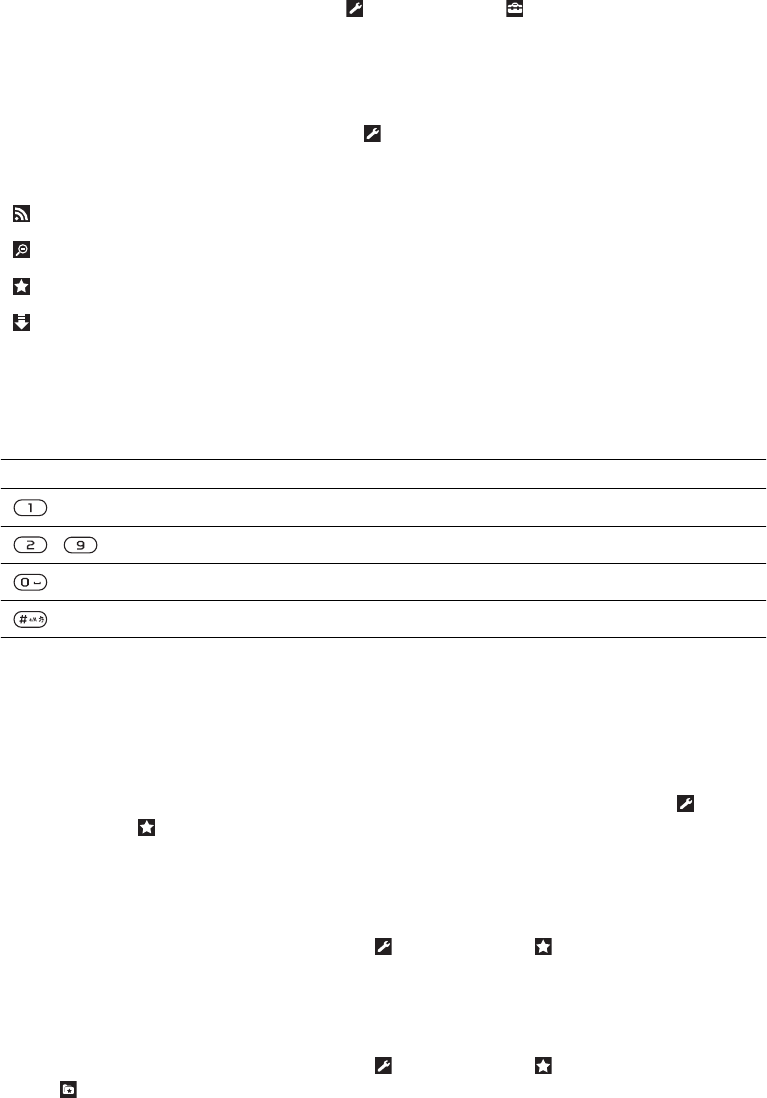
Internet
If you cannot use the Internet, see I cannot use Internet-based services on page 71.
To start browsing
1Select Search.
2Enter a web address, a search phrase or the name of a bookmark.
3Scroll to an item in the list and select Go to or Search.
To exit the browser
1When you are browsing the web, select and then select .
2Select Exit browser.
Web browser toolbar
When you are viewing a web page, select . The following options appear:
Icon Function
Add the web page to your RSS feeds
Pan and zoom the web page
Manage your favourite web pages
Manage the files you have downloaded from the Internet
Web browser shortcuts
You can use the keypad to go directly to a web browser function.
Key Shortcut
Bookmarks
- Enter text to Enter address, Search Internet or search in Bookmarks
Zoom
Overview (when Smart-Fit is off)
Bookmarks
You can create and edit bookmarks as quick links to your favourite web pages.
To create a bookmark
1When you are viewing a web page you want to add to your bookmarks, select
and then select .
2Select Add as bookmark.
To select a bookmark
1Select Menu > Internet.
2When you are browsing the Internet, select and then select .
3Scroll to a bookmark and select Go to.
To send a bookmark
1Select Menu > Internet.
2When you are browsing the Internet, select and then select
3Select and scroll to a bookmark.
4Select Options > Send and select a transfer method.
50
This is an Internet version of this publication. © Print only for private use.
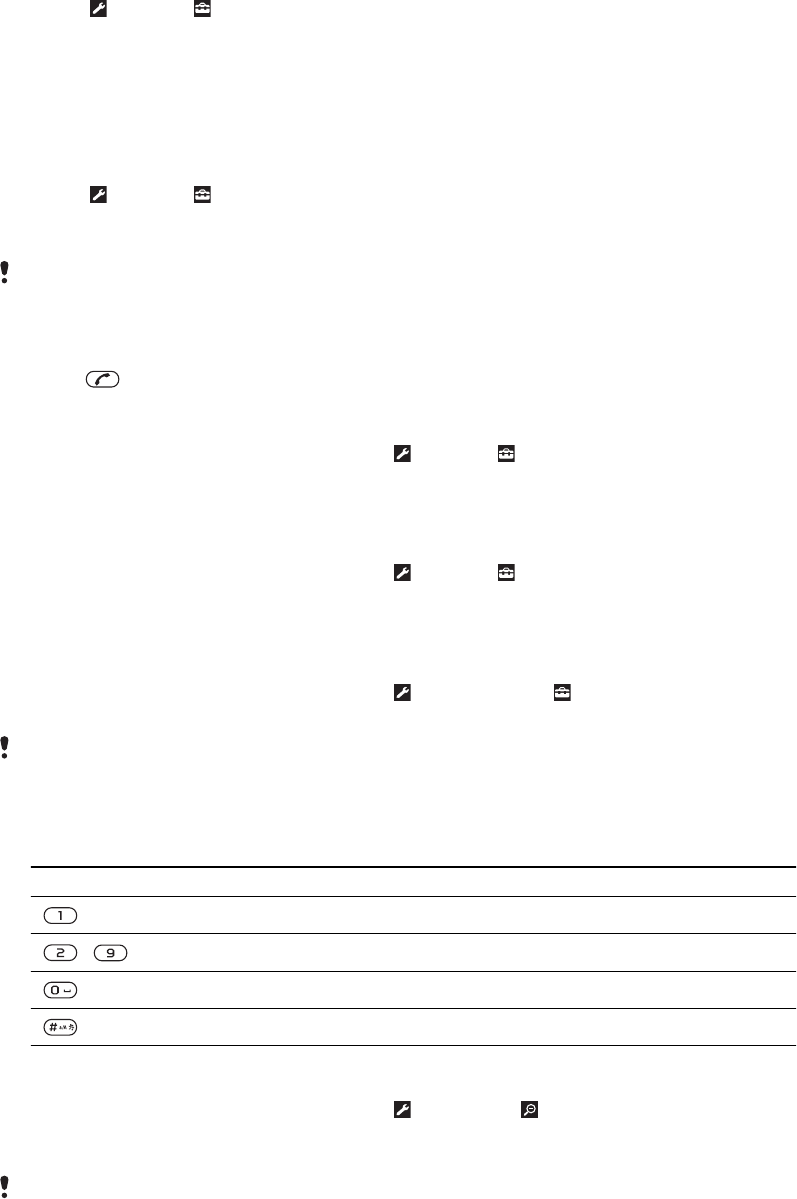
History pages
You can view and go to web pages you have previously visited.
To view history pages
1Select Menu > Internet.
2Select and then .
3Select History.
More browser features
To turn on or off Smart-Fit Rendering™
1Select Menu > Internet.
2Select and then .
3Select Settings > Smart-Fit.
4Select an option.
With Smart-Fit on, the web site is adjusted to your display to avoid horizontal scrolling. With
Smart-fit off, you can pan and zoom while viewing a web site.
To make a call when you are browsing the web
•Press .
To save a picture from a web page
1When you are viewing a web page, select and then .
2Select Save picture.
3Select a picture.
To find text on a web page
1When you are viewing a web page, select and then .
2Select Find on page.
3Enter text and press Find.
To send a link
1When you are viewing a web page, select and then select .
2Select Send link and select a transfer method.
Make sure the receiving device supports the transfer method you select.
Internet keypad shortcuts
You can use the keypad to go directly to an Internet browser function.
Key Shortcut
Bookmarks
- Enter text to Enter address, Search Internet or search in Bookmarks
Zoom
Overview (when Smart-Fit is off)
To use pan and zoom on a web page
1When you are viewing a web page, select , then select .
2Use the navigation key to move the frame.
3Press the centre selection key to zoom in on a part of the web page.
To use pan and zoom, Smart-Fit must be turned off.
51
This is an Internet version of this publication. © Print only for private use.

Internet security and certificates
Your phone supports secure browsing. Certain Internet services, such as banking, require
certificates in your phone. Your phone may already contain certificates when you buy it or
you can download new certificates.
To view certificates in the phone
•Select Menu > Settings > General > Security > Certificates.
File transfers
The File transfer manager keeps track of the files you download from the Internet, for
example media files, podcasts and games, and helps you access them. It also tracks your
photo uploads to web sites, such as web albums and blogs. In the File transfer manager
you also have the possibility to install downloaded Java applications, and to pause, resume
and cancel downloads.
To access a file using File transfer
1Select Menu > Organiser > File transfer.
2Scroll to the file.
3Press the centre selection key to access the file, or select Options for other actions.
Web feeds
You can subscribe to and download frequently updated content, such as news, podcasts
or photos, using web feeds.
To add new feeds from a web page
1When you browse a page on the Internet that provides web feeds, indicated by ,
select and then .
2For each feed you want to add, scroll to the feed and select Add > Yes.
3Select an update frequency.
To search for web feeds
1Select Menu > Media > Web feeds.
2Select New feed and enter a web address.
To download content via web feeds
1Select Menu > Media > Web feeds.
2Select an updated web feed.
3Scroll to an updated feed and select View.
4Scroll to a heading by by using and .
5Scroll to the item you want to download by using , then select Options >
Download file.
You can access downloaded files from the File transfer manager. See File transfers on page52.
You can also subscribe to and download web feed content to a computer using Media Go™.
See To transfer content using Media Go™ on page 42.
Updating web feeds
You can manually update your feeds, or schedule updates. When updates arrive,
appears on the screen.
To schedule web feed updates
1Select Menu > Media > Web feeds.
2Scroll to a feed and select Options > Schedule update.
3Select an option.
Frequent updates may be costly.
52
This is an Internet version of this publication. © Print only for private use.

Web feeds in standby
You can show news updates on the standby screen.
To show web feeds in standby
1Select Menu > Media > Web feeds.
2Scroll to a feed and select Options > Settings > Standby ticker > Show in
standby.
To access web feeds from standby
1From standby, select Ticker.
2To read more about a feed, press or to scroll to a headline and select View.
Podcasts
Podcasts are files, for example, radio programmes or video content, that you can download
and play. You subscribe to and download podcasts using Web feeds.
To access audio podcasts
•Select Menu > Media > Music > Music feeds.
To access video podcasts
•Select Menu > Media > Video > Video feeds.
Photo feeds
You can subscribe to Photo feeds and download photos.
To access photo feeds
•Select Menu > Media > Photo > Photo feeds.
Facebook™
Facebook is a social utility that helps you communicate with your friends, family and
coworkers.
To access Facebook
•Select Menu > Organiser > Applications > Facebook.
53
This is an Internet version of this publication. © Print only for private use.

Connected home
Connected home makes the phone a part of everyday living in terms of music and media
handling in home environment. It connects Hifi, TV, movies, gaming etc. on the home
network.
Wi-Fi™
Using Wi-Fi™ you can access the Internet wirelessly with your phone. You can browse the
Internet at home (personal networks) or in public access zones (hot spots):
•Personal networks – usually protected. A pass phrase or a key is required from the owner.
•Hot spots – usually non-protected but often requires you to log on to the operator’s service
before you get Internet access.
Using Wi-Fi
To be able to browse the Internet using Wi-Fi you need to search for and connect to an
available network and then open the Internet browser.
To turn on Wi-Fi
•Select Menu > Settings > Connectivity > Wi-Fi > Turn on.
To connect to a network
1Select Menu > Settings > Connectivity > Wi-Fi.
2Scroll to a network and select Connect.
To start browsing using Wi-Fi
1Make sure is showing in the status bar.
2Select Menu > Internet.
Often used networks can be saved as favourites. If you turn on Auto connect for one of these
networks, your phone will connect automatically to that network when it is within range.
DLNA™
Your phone has a built-in DLNA™ (Digital Living Network Alliance) functionality that
connects to your home network through Wi-Fi. Other DLNA devices connected to the same
home network can access, view and play images and music saved in your phone. A
compatible DLNA device can be, for example, a computer, camera, TV, PLAYSTATION®3
or another phone with DLNA functionallity.
Wi-Fi must be turned on and the phone must be connected to a favourite network
To set the phone as a DLNA server
1Select Menu > Settings > Connectivity > Content sharing.
2Select a favourite network from the list.
3Select On > Save.
A DLNA server exposes music, images and videos on the network. Other DLNA units play media
from the media servers on the network.
To view photos saved in your phone on another DLNA device
1Select Menu > Media > Photo > Cam. album.
2Select a month.
3Scroll to a photo and select Options > View on.
4Select a DLNA device from the list.
54
This is an Internet version of this publication. © Print only for private use.

To play music stored in your phone on another DLNA device
1Select Menu > Media > Music.
2Browse by category using the navigation key.
3Scroll to and select a title.
4Select Options >Play on.
5Select a DLNA device from the list.
To play music stored on another DLNA device in your phone
1Select Menu > Media > Music > Media servers.
2Select a Media server from the list.
3Browse by category using the navigation key.
4Scroll to a title and select Play.
Remote Play with PLAYSTATION®3
Remote Play with PLAYSTATION 3 allows your phone to connect wirelessly to a
PLAYSTATION 3 system. With Remote Play, you can access your PLAYSTATION 3 media
content on your phone. You can control and view the PLAYSTATION 3 screen, including
the menu, on your mobile phone. PLAYSTATION 3 will stream media to your phone. You
can browse video, photos and music and download and watch game and movie trailers
and images from PlayStation® Store. PlayTV* enables you to watch, record and search TV
programs.
* Some functions are market dependent
DRM protected media can not be streamed and played on your phone. For further information,
please check the PLAYSTATION 3 website.
To start Remote Play with PLAYSTATION 3
1Select Menu > Entertainment > Remote Play > Start.
2Select Yes > OK to confirm creation of a eight digit registration code on
PLAYSTATION 3.
3Enter the eight digit registration code created in PLAYSTATION 3 and select OK.
4Select Via Wi-Fi.
5Select PLAYSTATION 3 from the list and select OK.
To stop Remote Play with PLAYSTATION 3
1Select Options > End Remote Play.
2Select Yes to turn of the PLAYSTATION 3 too
55
This is an Internet version of this publication. © Print only for private use.

GPS
Your phone has a GPS receiver that uses satellite signals to calculate your location. Some
GPS features use the Internet. Data rates and charges may apply.
If you cannot use some GPS features, see I cannot use Internet-based services on page 71.
Using GPS
Your location can be found when you have a clear view of the sky. If your location is not
found after a few minutes, move to another location. To help the search, stand still and do
not cover the GPS antenna.
The first time you use the GPS it may take up to 10 minutes before your location is found.
Assisted start
With Assisted start your location is calculated more quickly. If not turned off, Assisted
start will automatically be used to find your location when Assisted GPS (A-GPS)
technology is available.
To set when to use Assisted start
1Select Menu > Location services > Settings > Assisted start.
2Select an option.
Google Maps™ for mobile
Google Maps™ lets you view your current location, find other locations and calculate
routes.
When you start Google Maps, your approximate location is shown using information from
nearby mobile towers. Your location is updated with a more precise position when the GPS
receiver finds your location.
To use Google Maps
•Select Menu > Location services > Google Maps.
To learn more about Google Maps
•When you use Google Maps, select Options > Help.
Driving directions
The Wisepilot™ application guides you to your destination using voice instructions. A trial
version of the Wisepilot application may be included in the phone.
Sony Ericsson does not warrant the accuracy of any directional services including but not limited
to turn-by-turn navigational services.
To start Wisepilot
•Select Menu > Location services > Navigation.
56
This is an Internet version of this publication. © Print only for private use.

More GPS features
Save locations
You can find all saved locations in My favourites.
To save your current location
1Select Menu > Location services > My favourites > Add new place.
2Select Edit and enter the title. Select OK.
3Scroll to Description: and select Add.
4Enter the description and select OK.
5Scroll to Position: and select Add > Current position.
6When the position is found, select Save.
To view a saved location on a map
1Select Menu > Location services > My favourites.
2Scroll to a location and select Go to.
To access favourites from Google Maps
•Press .
Location requests
External services may ask for your location.
To change access for external services
1Select Menu > Location services > Settings > Privacy.
2Select an option.
Turn off GPS
The GPS receiver turns off automatically when it is not in use. You can also turn the GPS
receiver off manually. This saves battery power when you use features that do not require
the GPS receiver to find your location.
To turn on or off GPS manually
1Select Menu > Location services > Settings.
2Select Enable GPS or Disable GPS.
Tracker
Tracker is a GPS-based sports application which allows you to keep track of your speed,
distance, route and energy consumption during training. You can base the training on how
long time you want to train or on what distance you want to cover. You can also base it on
a previous training route which has GPS data.
Information provided by use of the Tracker application is approximate. Sony Ericsson makes no
warranty of any kind with respect to the accuracy of the Tracker application. Any serious health
and fitness concerns should be referred to a health care professional.
To start a training session
1Select Menu > Location services > Tracker > Start training.
2Select a training type.
3Scroll to an item, select Edit and enter the data.
4To save, select Done.
5To start training, select Start.
To switch between training views
•During a training session, press or to view information on training duration,
progress and live comparison with a previous session.
57
This is an Internet version of this publication. © Print only for private use.

To compare results during training
1Select Menu > Location services > Tracker > Start training.
2Select Route based.
3Scroll to Route:, select Edit and select a route.
4Scroll to Live compare and select Edit.
5Scroll to the result you want to compare with and select Compare.
6Select Done and then Start.
A GPS location is required before results can be compared.
To end a training session manually
•During a training session, select Pause > End.
Results
The training result is shown after a session is ended. You can view past results anytime,
and compare them if they have GPS data.
To view a training result
1Select Menu > Location services > Tracker > Results.
2Scroll to a month and select View.
3Scroll to a date and select View.
4Select a training result. If you have used laps, press or to view result per lap.
To compare results
1Select Menu> Location services > Tracker > Results.
2Scroll to a result and select Options > Compare.
3Select a result to compare with.
A GPS location is required before results can be compared.
Energy consumption
To calculate and view the energy consumption for a session you must first set your personal
profile in Settings in Tracker. You view the energy consumption in the result view.
To set the personal profile
1Select Menu > Location services > Tracker > Settings > Personal profile.
2Select an item, enter data and select OK.
3When finished, select Options > Save profile.
To turn on energy consumption
•Select Menu > Location services > Tracker > Settings > Energy consumption
> On.
58
This is an Internet version of this publication. © Print only for private use.

Synchronising
You can synchronise your phone in two different ways: using a computer program, or using
an Internet service.
Use only one of the synchronisation methods at a time with your phone.
For more information, go to www.sonyericsson.com/support to read the Synchronisation
Feature guide.
Synchronising using a computer
You can use a USB cable or Bluetooth wireless technology to synchronise phone contacts,
appointments, bookmarks, tasks and notes with Online Service or a computer program
such as Microsoft® Outlook®.
Before synchronising, you need to install the Sony Ericsson PC Suite. Sony Ericsson PC
Suite software is available for download through PC Companion or from
www.sonyericsson.com/support
.
To download Mac compatible software, go to
www.sonyericsson.com/support
.
To synchronise using the Sony Ericsson PC Suite
1Computer: Start Sony Ericsson PC Suite from Start/Programs/Sony Ericsson/
Sony Ericsson PC Suite.
2Follow the instructions in the Sony Ericsson PC Suite for how to connect.
3When you are notified that the Sony Ericsson PC Suite has found your phone, you
can start synchronising.
For usage details, see the Sony Ericsson PC Suite Help section once the software has been
installed on your computer.
Synchronising using an Internet service
You can synchronise with an Internet service using SyncML™ or a Microsoft® Exchange
Server using Microsoft Exchange ActiveSync. For more information, go to
www.sonyericsson.com/support to read the Synchronisation Feature guide.
59
This is an Internet version of this publication. © Print only for private use.

More features
Flight mode
In Flight mode the network and radio transceivers are turned off to prevent disturbance to
sensitive equipment.
When the flight mode menu is activated you are asked to select a mode the next time you
turn on your phone:
•Normal mode – full functionality
•Flight mode – limited functionality
To activate the flight mode menu
•Select Menu > Settings > General > Flight mode > Continue > Show at
startup.
To select flight mode
1When the flight mode menu is activated, turn off your phone.
2Turn on your phone and select Flight mode. appears.
Alarms
You can set a sound or the radio as an alarm signal. The alarm sounds even if the phone
is turned off. When the alarm sounds you can silence it or turn it off.
To set the alarm
1Select Menu > Organiser > Alarms.
2Scroll to an alarm and select Edit.
3Scroll to Time: and select Edit.
4Enter a time and select OK > Save.
To set the recurrent alarm
1Select Menu > Organiser > Alarms.
2Scroll to an alarm and select Edit.
3Scroll to Recurrent: and select Edit.
4Scroll to a day and select Mark.
5To select another day, scroll to the day and select Mark.
6Select Done > Save.
To set the alarm signal
1Select Menu > Organiser > Alarms.
2Scroll to an alarm and select Edit.
3Scroll to the tab.
4Scroll to Alarm signal: and select Edit.
5Find and select an alarm signal. Select Save.
To silence the alarm
•When the alarm sounds, press any key.
•To repeat the alarm, select Snooze.
To turn off the alarm
•When the alarm sounds, press any key, then select Turn off.
To cancel the alarm
1Select Menu > Organiser > Alarms.
2Scroll to an alarm and select Turn off.
60
This is an Internet version of this publication. © Print only for private use.

The alarm in silent mode
You can set the alarm not to sound when the phone is in silent mode.
To set an alarm to sound or not in silent mode
1Select Menu > Organiser > Alarms.
2Scroll to an alarm and select Edit.
3Scroll to the tab.
4Scroll to Silent mode: and select Edit.
5Select an option.
To set the snooze duration
1Select Menu > Organiser > Alarms.
2Scroll to an alarm and select Edit.
3Scroll to Snooze duration: and select Edit.
4Select an option.
Calendar
You can synchronise your calendar with a computer calendar, with a calendar on the Web or
with a Microsoft® Exchange Server (Microsoft® Outlook®).
Appointments
You can add new appointments or reuse existing appointments.
To add an appointment
1Select Menu > Organiser > Calendar.
2Select a date.
3Scroll to New entry and select Add.
4Enter the information and confirm each entry.
5Select Save.
To view an appointment
1Select Menu > Organiser > Calendar.
2Select a date.
3Scroll to an appointment and select View.
To edit an appointment
1Select Menu > Organiser > Calendar.
2Select a date.
3Scroll to an appointment and select View.
4Select Options > Edit.
5Edit the appointment and confirm each entry.
6Select Save.
To set when reminders should sound
1Select Menu > Organiser > Calendar.
2Select a date.
3Select Options > Advanced > Reminders.
4Select an option.
A reminders option set in calendar affects a reminders option set in tasks.
Notes
You can make notes and save them. You can also show a note in standby.
61
This is an Internet version of this publication. © Print only for private use.

To add a note
1Select Menu > Organiser > Notes.
2Scroll to New note and select Add.
3Write a note and select Save.
To show a note in standby
1Select Menu >Organiser > Notes.
2Scroll to a note and select Options > Show in standby.
To hide a note from standby
1Select Menu > Organiser > Notes.
2Scroll to the note shown in standby. This is marked with an icon. Select Options >
Hide in standby.
Tasks
You can add new tasks or reuse existing tasks.
To add a task
1Select Menu > Organiser > Tasks.
2Select New task and select Add.
3Select an option.
4Enter details and confirm each entry.
To set when reminders should sound
1Select Menu > Organiser > Tasks.
2Scroll to a task and select Options > Reminders.
3Select an option.
A reminders option set in tasks affects a reminders option set in calendar.
Profiles
You can change settings such as the ring volume and vibrating alert to suit different
locations. You can reset all profiles to the phone’s original settings.
To select a profile
1Select Menu > Settings > General > Profiles.
2Select a profile.
To view and edit a profile
1Select Menu > Settings > General > Profiles.
2Scroll to a profile and select Options > View and edit.
You cannot rename the Normal profile.
Time and date
To set the time
1Select Menu > Settings > General > Time & date > Time.
2Enter the time and select Save.
To set the date
1Select Menu > Settings > General > Time & date > Date.
2Enter the date and select Save.
62
This is an Internet version of this publication. © Print only for private use.

To set the time zone
1Select Menu > Settings > General > Time & date > My time zone.
2Select the time zone you are in.
If you select a city, My time zone also updates the time when daylight saving time changes.
To change the clock size of the standby screen
1Select Menu > Settings > Display > Clock size.
2Select an option.
Themes
You can change the appearance of the screen through items such as colours and
wallpaper. You can also create new themes and download them. For more information, go
to www.sonyericsson.com/fun.
To set a theme
1Select Menu > Settings > Display > Theme.
2Scroll to a theme and select Set.
Main menu layout
You can change the layout of the icons in the main menu.
To change the main menu layout
1Select Menu > Options > Main menu layout.
2Select an option.
Ringtones
To set a ringtone
1Select Menu > Settings > Sounds & alerts > Ringtone.
2Find and select a ringtone.
To set the ringtone volume
1Select Menu > Settings > Sounds & alerts > Ring volume.
2Press or to adjust the volume.
3Select Save.
To turn off the ringtone
•Press and hold down . appears.
The alarm signal is not affected.
To set the vibrating alert
1Select Menu > Settings > Sounds & alerts > Vibrating alert.
2Select an option.
Screen orientation
You can change between landscape and portrait orientation, or select Auto rotate to have
the orientation change when you rotate the phone.
To change screen orientation in the browser
1Select Menu > Internet.
2Select Options > Advanced > Orientation.
3Select an option.
63
This is an Internet version of this publication. © Print only for private use.

To change screen orientation in Media
1Select Menu > Media > Settings > Orientation.
2Select an option.
Games
Your phone contains preloaded games. You can also download games. For more
information, go to www.sonyericsson.com/fun. Help texts are available for most games.
To start a game
1Select Menu > Media > Games.
2Select a game.
To end a game
•Press .
Applications
You can download and run Java applications. You can also view information or set different
permissions. If you cannot use Java applications, see I cannot use Internet-based
services on page 71.
To select a Java application
1Select Menu > Organiser > Applications.
2Select an application.
To set permissions for a Java application
1Select Menu > Organiser > Applications.
2Scroll to an application and select Options > Permissions.
3Set permissions.
Java application screen size
Some Java applications are designed for a specific screen size. For more information,
contact the application vendor.
To set the screen size for a Java application
1Select Menu > Organiser > Applications.
2Scroll to an application and select Options > Screen size.
3Select an option.
To set a Java™ application as a wallpaper
1Select Menu > Settings > Display.
2Select Wallpaper > Application.
3Select a Java application.
You can only see the Java applications that have support for wallpaper.
Antivirus
Antivirus identifies and removes applications you install on your phone that become infected
by viruses. It automatically scans applications during installation. When an infected
application is detected, you can delete or release the infected application. You can select
a 30-day free evaluation or enter a subscription number. We recommend that you update
the antivirus application with the latest virus protection frequently. You need the correct
Internet settings in your phone to use this function.
Our inclusion or your use of antivirus software does not ensure that your use of this product will
be free from exposure to viruses, malware or other harmful software.
64
This is an Internet version of this publication. © Print only for private use.

To turn on Antivirus
1Select Menu > Settings > General > Security > Antivirus.
2Follow the instructions to use the setup wizard.
To turn off Antivirus
1Select Menu > Settings > General > Security > Antivirus > Virus scan.
2Select Off.
PIN codes
SIM protection
This lock only protects your subscription. Your phone will work with a new SIM card. If the
lock is on, you have to enter a PIN (Personal Identity Number).
If you enter your PIN incorrectly three times in a row, the SIM card is blocked and you need
to enter your PUK (Personal Unblocking Key). Your PIN and PUK are supplied by your
network operator.
To unblock the SIM card
1When PIN blocked appears, enter your PUK and select OK.
2Enter a new four-to-eight-digit PIN and select OK.
3Re-enter the new PIN and select OK.
To edit the PIN
1Select Menu > Settings > General > PIN codes > SIM protection > Change
PIN.
2Enter your PIN and select OK.
3Enter a new four-to-eight-digit PIN and select OK.
4Re-enter the new PIN and select OK.
If Codes do not match appears, you entered the new PIN incorrectly. If Incorrect PIN appears,
you entered the old PIN incorrectly.
To use the SIM card lock
1Select Menu > Settings > General > PIN codes > SIM protection > Protection.
2Select an option.
3Enter your PIN and select OK.
Phone protection
You can stop unauthorised use of your phone. Change the phone lock code (0000) to any
four-to-eight-digit personal code.
It is important that you remember your new code. If you forget it, you need to take your phone
to your local Sony Ericsson retailer.
To use the phone lock
1Select Menu > Settings > General > PIN codes > Phone protection >
Protection.
2Select an option.
3Enter the phone lock code and select OK.
When Automatic phone protection is activated the phone protection code must be entered when
another SIM card is inserted.
To unlock the phone
•When Phone locked appears, enter your phone lock code and select OK.
65
This is an Internet version of this publication. © Print only for private use.

To change the phone lock code
1Select Menu > Settings > General > PIN codes > Phone protection > Change
code.
2Enter the old code and select OK.
3Enter the new code and select OK.
4Repeat the code and select OK.
IMEI number
Keep a copy of your IMEI (International Mobile Equipment Identity) number in case your
phone is stolen.
To view your IMEI number
•Press , , , , .
66
This is an Internet version of this publication. © Print only for private use.
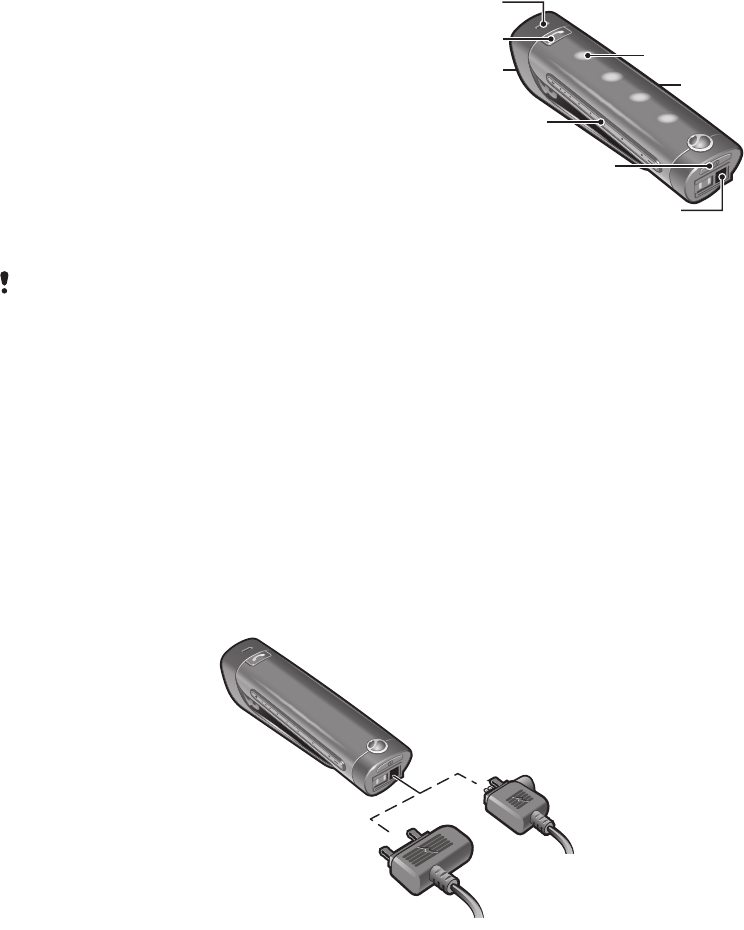
Stereo Streaming Bluetooth™
Headset MH100
1 Microphone
2
4
5
6
3
8
7
1
2 Call key
3 Earpiece connector
4 Volume touch area
5 On/off key
6 Charger connector
7 Next/Play-Pause/Previous keys
8 Music/battery/status light indicators
If you are using a headset other than the MH100, go to
www.sonyericsson.com/support
for more
information.
Introduction
The Stereo Streaming Bluetooth Headset MH100 lets you stay in control of your incoming
and outgoing phone calls. You can enjoy stereo audio from a phone or other Bluetooth
device, such as a computer or a portable music player. During calls, the music automatically
pauses and starts playing again when the call ends.
Charging
Before using the headset for the first time, charge it with the supplied charger for 8 hours.
The normal charging time is 2.5 hours.
Turning on and off
To turn on the headset
•Press and hold down the on/off key until a light appears.
To turn off the headset
•Press and hold down the on/off key until the lights have disappeared.
Pairing the headset
The MH100 is already pre-paired with the phone it is shipped with. The MH100 and the
phone connect automatically the first time you turn on this headset.
67
This is an Internet version of this publication. © Print only for private use.

Pairing the headset with a different phone
If you want to use the headset with a different phone you need to pair the headset with that
phone. After successful pairing, the headset connects automatically to the phone as soon
as the headset is turned on and within range.
To pair the headset with a phone
1Make sure the headset is turned off.
2Turn on the Bluetooth function in the phone. For instructions, see the phone User
guide.
3Turn on Bluetooth visibility in the phone. This makes the phone visible to other
Bluetooth devices.
4Place the phone within 20 cm (8 inches) of the headset.
5Press and hold down the on/off key on the headset for about 5 seconds until the
indicator light flashes blue and green alternately.
6In your phone: Search for and add a new device.
7The passcode is 0000.
8The indicator light flashes blue for 2 seconds when successfully paired.
The headset turns off if you do not pair it with the phone within 10 minutes.
Adjusting the volume
To adjust speaker or music volume
•During a call, or when listening to music or the FM radio, swipe your finger along the
volume touch area.
Calling
To make a call
•Dial the number using the phone keys. The call is automatically activated in the
headset.
To end a call
•Press the call key briefly.
To make a call using voice commands
•Press the call key briefly, wait for a beep and then say the command.
To answer a call
•A beep indicates an incoming call. Press the call key briefly.
To reject a call
•Press and hold down the call key until you hear a beep.
To re-dial a number
•Double-click the call key.
To answer a second call
•Press the call key. The ongoing call is put on hold.
To switch between two calls
•Press and hold down the call key until you hear a beep.
Calling using voice commands
Voice commands can be useful when you are using the headset. For more information on
voice commands, and if your phone supports it, see the phone User guide.
68
This is an Internet version of this publication. © Print only for private use.
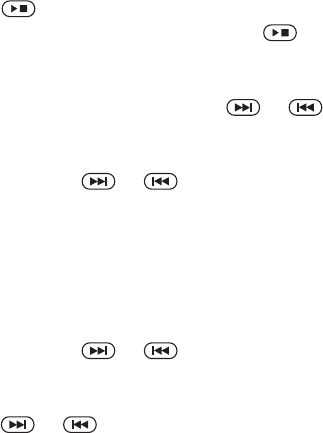
Transferring sound
To transfer the sound from the headset to the phone
•See the phone User guide.
To transfer the sound from the phone to the headset
•During a call on the phone, press the call key.
Listening to music
To listen to music
1Press to start the media player in your phone.
2To start and pause the music, press on the headset.
To move between tracks
•When you listen to music, press or .
To move within a track
•Press and hold or key until you reach the desired position.
Listening to the Radio
1Make sure your headset has a connection to the phone.
2Start the radio in your phone.
To search for channels manually
•Press and hold or until you reach the desired position.
To select a preset radio station
•Press or .
Resetting headset
Reset the headset if it behaves unexpectedly.
Resetting the headset removes all information about paired devices other than the phone
it was shipped with.
To reset the headset
1Make sure the headset is turned off.
2Press and hold down the on/off key until the indicator light flashes blue and green
alternately.
3Simultaneously press and hold down the on/off key and the call key until the headset
turns off.
Battery
A battery that has been infrequently used, or a new one, could have reduced capacity. You
may need to recharge it a number of times.
When the battery level is low, you hear a low beep. If you do not charge the headset, it
automatically turns off after 10 minutes.
Battery status
Battery colour Description
One red light The battery needs charging soon
Three green flashes The battery is half full
Four green flashes The battery is fully charged
69
This is an Internet version of this publication. © Print only for private use.

To check the battery status
•Press the power key briefly. The number of green light indicators shows how full the
battery is.
Troubleshooting
Redial does not work
•Make sure the call list in the phone is not empty
•Make sure your phone or other device supports the Bluetooth handsfree profile
I cannot answer a second call
•Make sure your phone supports the Bluetooth handsfree profile.
Voice commands do not work
•Make sure the voice commands are enabled and recorded in your phone before you start
using them.
•Make sure your phone supports the Bluetooth headset profile.
The music is not played in the headset
•Make sure your phone or other device is paired with the headset. You may have to restart
the media player and select to use the headset.
The radio does not play in the headset
•Make sure the MH100 is connected to the phone.
•If you have paired the MH100 with a phone other than the Aino, this phone might not
support the FM reception in the MH100.
The headset is automatically turned off
•The battery level is too low. You hear a beep approximately 10 minutes before the headset
turns off. Charge the battery.
•The headset turns off if you do not pair it with the phone within 10 minutes.
Unexpected behaviour
•Reset the headset.
No connection to the phone
Make sure the headset is charged and within range of the phone. We recommend a
maximum distance of 10 metres (33 feet) with no solid objects in between. Check or reset
the Bluetooth settings in the phone. Try to pair the headset again.
It is not possible to use the headset during charging.
Go to cross reference error for more information on Bluetooth and pairing.
70
This is an Internet version of this publication. © Print only for private use.

Troubleshooting
Some problems can be fixed using Update Service. Using Update Service on a regular
basis will optimise the phone’s performance. See Updating your phone on page 45.
Some problems will require you to call your network operator.
For more support go to www.sonyericsson.com/support.
Common questions
Where can I find the regulatory information such as my IMEI number if
I cannot turn on my phone?
XXXXXXXX - XXXXXX - X
I have problems with memory capacity or the phone is working slowly
Restart your phone every day to free memory or do a Master reset.
Master reset
If you select Reset settings, the changes that you have made to settings will be deleted.
If you select Reset all, your settings and content, such as contacts, messages, pictures,
sounds and downloaded games, will be deleted. You may also lose content that was in the
phone at purchase.
To reset the phone
1Select Menu > Settings > General > Master reset.
2Select an option.
3Follow the instructions that appear.
I cannot charge the phone or battery capacity is low
The charger is not properly connected or the battery connection is poor. Remove the
battery and clean the connectors.
The battery is worn out and needs to be replaced. See Charging the battery on page 7.
No battery icon appears when I start charging the phone
It may take a few minutes before the battery icon appears on the screen.
The screen turns black. What do I do?
•If the screen turns black, touch somewhere on the screen to activate the screen.
Some menu options appear in grey
A service is not activated. Contact your network operator.
I cannot use Internet-based services
Your subscription does not include data capability. Settings are missing or incorrect.
71
This is an Internet version of this publication. © Print only for private use.

You can download settings using the Settings download or from
www.sonyericsson.com/support.
To download settings
1Select Menu > Settings > User help > Settings download.
2Follow the instructions that appear.
Contact your network operator or service provider for more information.
I cannot send messages from my phone
To send messages, you need to set a service centre number. The number is supplied by
your service provider and is usually saved on the SIM card. If the number to your service
centre is not saved on your SIM card, you must enter the number yourself.
To send most picture messages, you must set an MMS profile and the address of your
message server. If no MMS profile or message server exists, you can receive all the settings
automatically from your network operator, download settings using the Basic setup or at
www.sonyericsson.com/support.
To enter a service centre number
1Select Menu > Settings > Connectivity > Message settings > Text message and
scroll to Service centre. The number is shown if it is saved on the SIM card.
2If there is no number shown, select Edit.
3Scroll to New service centre and select Add.
4Enter the number, including the international “+” sign and country code.
5Select Save.
To select an MMS profile
1Select Menu > Settings > Connectivity > Message settings > Multim.
message.
2Select an existing profile or create a new one.
To set the message server address
1Select Menu > Settings > Connectivity > Message settings > Multim.
message.
2Scroll to a profile and select Options > Edit.
3Scroll to Message server and select Edit.
4Enter the address and select OK > Save.
The phone does not ring or rings too softly
Make sure that Silent mode has not been set to On. See To turn off the ringtone on
page 63.
Check the ringtone volume. See To set the ringtone volume on page 63.
Check the profile. See To select a profile on page 62.
Check the divert call options. See To divert calls on page 21.
The phone cannot be detected by other devices using Bluetooth
wireless technology
You have not turned the Bluetooth function on. Make sure that the visibility is set to Show
phone. See To turn on the Bluetooth function on page 43.
I cannot synchronise or transfer content between my phone and the
computer, when using a USB cable.
The software or the USB drivers have not been properly installed. Go to
www.sonyericsson.com/support to read Feature guides which contain detailed installation
instructions and troubleshooting sections.
72
This is an Internet version of this publication. © Print only for private use.
Error messages
Insert SIM
There is no SIM card in your phone or you may have inserted it incorrectly.
See To insert the SIM card on page 4.
The SIM card connectors need cleaning. If the card is damaged, contact your network
operator.
Insert correct SIM card
Your phone is set to work only with certain SIM cards. Check if you are using the correct
operator SIM card.
Incorrect PIN/Incorrect PIN2
You have entered your PIN or PIN2 incorrectly.
Enter the correct PIN or PIN2 and select OK.
PIN blocked/PIN2 blocked
You have entered your PIN or PIN2 code incorrectly three times in a row.
To unblock, see SIM protection on page 65.
Codes do not match
Codes that you have entered do not match. When you want to change a security code, for
example your PIN, you have to confirm the new code. See SIM protection on page 65.
No netw. coverage
•Your phone is in flight mode. See Flight mode on page 60.
•Your phone is not receiving any network signal, or the received signal is too weak. Contact
your network operator and make sure that the network has coverage where you are.
•The SIM card is not working properly. Insert your SIM card in another phone. If this works,
it is probably your phone that is causing the problem. Please contact the nearest
Sony Ericsson service location.
Emergency calls only
You are within range of a network, but you are not allowed to use it. However, in an
emergency, some network operators allow you to call the international emergency number
112. See Emergency calls on page 17.
PUK blocked. Contact operator.
You have entered your personal unblocking key code (PUK) incorrectly 10 times in a row.
Sony Ericsson Aino U10i/U10a/U10
This User guide is published by Sony Ericsson Mobile Communications AB or its local affiliated company, without any
warranty. Improvements and changes to this User guide necessitated by typographical errors, inaccuracies of current
information, or improvements to programs and/or equipment, may be made by Sony Ericsson Mobile Communications
AB at any time and without notice. Such changes will, however, be incorporated into new editions of this User guide.
All rights reserved.
©Sony Ericsson Mobile Communications AB, 2009
Publication number: xxxx-xxxx.1
Your mobile phone has the capability to download, store and forward additional content, e.g. ringtones. The use of
such content may be restricted or prohibited by rights of third parties, including but not limited to restriction under
applicable copyright laws. You, and not Sony Ericsson, are entirely responsible for additional content that you
download to or forward from your mobile phone. Prior to your use of any additional content, please verify that your
intended use is properly licensed or is otherwise authorized. Sony Ericsson does not guarantee the accuracy, integrity
or quality of any additional content or any other third party content. Under no circumstances will Sony Ericsson be
liable in any way for your improper use of additional content or other third party content.
Smart-Fit Rendering is a trademark or a registered trademark of ACCESS Co., Ltd.
Bluetooth is a trademark or a registered trademark of Bluetooth SIG Inc. and any use of such mark by
Sony Ericsson is under license.
The Liquid Identity logo, PlayNow, SensMe and TrackID are trademarks or registered trademarks of Sony Ericsson
Mobile Communications AB.
73
This is an Internet version of this publication. © Print only for private use.
TrackID™ is powered by Gracenote Mobile MusicID™. Gracenote and Gracenote Mobile MusicID are trademarks or
registered trademarks of Gracenote, Inc.
Sony is a trademark or registered trademark of Sony Corporation.
Media Go is a trademark or registered trademark of Sony Media Software and Services.
microSD is a trademark or a registered trademark of SanDisk Corporation.
PictBridge is a trademark or registered trademark of Canon Kabushiki Kaisha Corporation.
Wi-Fi is a trademark or a registered trademark of the Wi-Fi Alliance.
DLNA is a trademark or registered trademark of the Digital Living Network Alliance.
Google Maps™ is a trademark or registered trademark of Google, Inc.
PLAYSTATION is a trademark or registered trademark of Sony Computer Entertainment, Inc.
Wisepilot is a trademark of Appello Systems AB and its products are the property of Appello Systems AB and are
protected against unauthorized use by trademark laws.
SyncML is a trademark or registered trademark of Open Mobile Alliance LTD.
Facebook is a trademark or registered trademark of Facebook, Inc.
Ericsson is a trademark or registered trademark of Telefonaktiebolaget LM Ericsson.
Mac is a trademark of Apple Inc., registered in the U.S. and other countries.
Adobe Photoshop Album Starter Edition is a trademark or registered trademark of Adobe Systems Incorporated in
the United States and/or other countries.
Microsoft, Windows, Outlook, Windows Vista, Windows Server and ActiveSync are registered trademarks or
trademarks of Microsoft Corporation in the United States and/or other countries.
This product is protected by certain intellectual property rights of Microsoft. Use or distribution of such technology
outside of this product is prohibited without a license from Microsoft.
Content owners use Windows Media digital rights management technology (WMDRM) to protect their intellectual
property, including copyrights. This device uses WMDRM software to access WMDRM-protected content. If the
WMDRM software fails to protect the content, content owners may ask Microsoft to revoke the software's ability to
use WMDRM to play or copy protected content. Revocation does not affect unprotected content. When you download
licenses for protected content, you agree that Microsoft may include a revocation list with the licenses. Content owners
may require you to upgrade WMDRM to access their content. If you decline an upgrade, you will not be able to access
content that requires the upgrade.
This product is licensed under the MPEG-4 visual and AVC patent portfolio licenses for the personal and non-
commercial use of a consumer for (i) encoding video in compliance with the MPEG-4 visual standard ("MPEG-4 video")
or the AVC standard ("AVC video") and/or (ii) decoding MPEG- 4 or AVC video that was encoded by a consumer
engaged in a personal and non-commercial activity and/or was obtained from a video provider licensed by MPEG LA
to provide MPEG-4 and/or AVC video. No license is granted or shall be implied for any other use. Additional information
including that relating to promotional, internal and commercial uses and licensing may be obtained from MPEG LA,
L.L.C. See http://www.mpegla.com. MPEG Layer-3 audio decoding technology licensed from Fraunhofer IIS and
Thomson.
Java, JavaScript and Java-based trademarks and logos are trademarks or registered trademarks of Sun
Microsystems, Inc. in the U.S. and other countries.
End-user license agreement for Sun Java Platform, Micro Edition.
1. Restrictions: Software is confidential copyrighted information of Sun and title to all copies is retained by Sun and/
or its licensors. Customer shall not modify, decompile, disassemble, decrypt, extract, or otherwise reverse engineer
Software. Software may not be leased, assigned, or sublicensed, in whole or in part.
2. Export Regulations: This product, including any software or technical data contained in or accompanying the
product, may be subject to import and export regulations of the European Union, the United States and other countries.
The user and any possessor of the product agrees to comply strictly with all such regulations and acknowledges that
it is their responsibility to obtain any required licenses to export, re-export, or import this product. Without limiting the
foregoing, and as an example, the user and any possessor of the product: (1) must not knowingly export or re-export
Products to destinations identified pursuant to Articles in Chapter II of European Council Regulation (EC) 1334/2000;
(2), must comply with U.S. government Export Administration Regulations ("EAR", 15 C.F.R. §§ 730-774, http://
www.bis.doc.gov/ ) administered by Department of Commerce, Bureau of Industry and Security; and (3) must comply
with economic sanctions regulations (30 C.F.R. §§ 500 et. seq.,., http://www.treas.gov/offices/enforcement/ofac/)
administered by the U.S. Department of Treasury, Office of Foreign Assets Control. The user and any possessor of
the product may not transport or deliver the product, its accessories or separate software to any country, region,
entity or person prohibited by these regulations.
Restricted Rights: Use, duplication or disclosure by the United States government is subject to the restrictions as set
forth in the Rights in Technical Data and Computer Software Clauses in DFARS 252.227-7013(c) (1) (ii) and FAR
52.227-19(c) (2) as applicable.
Other product and company names mentioned herein may be the trademarks of their respective owners.
Any rights not expressly granted herein are reserved.
All illustrations are for illustration only and may not accurately depict the actual phone.
74
This is an Internet version of this publication. © Print only for private use.
Index
A
activity menu ...........................................................12
alarms ......................................................................60
answering service ....................................................20
Antivirus ...................................................................64
applications .............................................................64
appointments ..........................................................61
assembly ...................................................................4
audio book ..............................................................37
auto rotate ...............................................................63
B
backing up and restoring ........................................44
battery
capacity .............................................................6
charging ............................................................7
inserting .............................................................4
blog ...................................................................30, 31
Bluetooth .................................................................30
Bluetooth™ wireless technology .............................43
bookmarks ...............................................................50
business card ..........................................................20
C
calendar ...................................................................61
call divert .................................................................21
call list ......................................................................17
call numbers in message .........................................46
call time ...................................................................23
caller-specific ringtones ..........................................19
calls
accepting .........................................................22
answering and rejecting ..................................16
emergency .......................................................17
international .....................................................16
making and receiving ......................................16
putting on hold ................................................22
recording .........................................................40
video ................................................................17
camera .....................................................................24
printing ............................................................31
clear bass ................................................................36
clear stereo ..............................................................36
clip ...........................................................................31
clips .........................................................................30
conference calls ......................................................22
Connected home .....................................................54
contacts
adding phone contacts ...................................18
default contacts ...............................................18
groups .............................................................20
Smart search ...................................................18
conversations ..........................................................47
costs ..........................................................................6
D
date .........................................................................62
DLNA™ ....................................................................54
download .................................................................52
download
settings ............................................................72
downloading music .................................................38
E
editing phots ............................................................29
email ........................................................................47
emergency numbers ................................................17
equaliser ..................................................................36
F
face detection ..........................................................24
file ............................................................................52
file manager .............................................................41
flight mode ..............................................................60
G
games ......................................................................64
geo tagging .............................................................29
Google Maps™ .......................................................56
GPS .........................................................................56
groups .....................................................................20
H
handsfree ...........................................................21, 35
hiding number .........................................................23
I
imaging ....................................................................24
IMEI number ............................................................66
internet ....................................................................52
Internet
bookmarks ......................................................50
screen orientation ............................................63
security and certificates ..................................52
settings ............................................................71
K
keys .....................................................................5, 67
L
language ..................................................................13
location services ......................................................56
lock
SIM card ..........................................................65
M
master reset ............................................................71
media browser ...........................................................9
Media Go™ .............................................................42
media transfer .........................................................42
memory ...................................................................12
memory card ...........................................................12
memory status .........................................................19
menu overview ........................................................10
message ..................................................................30
messages
email ................................................................47
picture .............................................................46
text ..................................................................46
voice ................................................................47
microphone .............................................................16
MMS ........................................................................30
MMS See picture messages
model name ...............................................................6
music feed .........................................................52, 53
music player ......................................................34, 35
my numbers .............................................................22
my phone number .....................................................6
N
navigating menus ....................................................11
notes ........................................................................61
O
online
music ...............................................................38
video clips .......................................................38
75
This is an Internet version of this publication. © Print only for private use.
P
pan and zoom
web pages .......................................................51
PC Companion ........................................................41
PC Suite ..................................................................59
phone
turning on ..........................................................5
phone memory ....................................................6, 12
phone name ............................................................43
photo .................................................................30, 31
photo feed ...............................................................52
photos .....................................................................30
feeds ................................................................53
geo tagging .....................................................29
printing ............................................................31
tags ..................................................................29
picture .....................................................................31
picture messages ....................................................46
pictures ....................................................................30
PIN .......................................................................6, 65
playlists ....................................................................36
PlayNow™ ...............................................................38
podcast .............................................................52, 53
podcasts ..................................................................53
power saving ...........................................................44
profiles .....................................................................62
protection
phone ..............................................................65
PUK .........................................................................65
push email ...............................................................49
Q
Quick text input .......................................................14
R
radio ........................................................................38
recording
listening to .......................................................40
Remote Play ............................................................55
restricted dialling .....................................................23
ringtones ..................................................................63
setting ..............................................................63
roaming .....................................................................6
RSS feeds - see web feeds
S
screen icons ..............................................................8
screen orientation ....................................................63
search
on web pages ..................................................51
selection keys ..........................................................11
send ...................................................................30, 31
SensMe™ ................................................................37
setting
ringtones .........................................................63
settings
download .........................................................72
Internet ............................................................71
shake control ...........................................................35
share ........................................................................30
shortcuts .................................................................11
web browser ....................................................50
SIM card
copying to/from ...............................................19
inserting .............................................................4
lock and unblocking ........................................65
SMS See text messages
SOS See emergency numbers
sound recorder ........................................................40
speed dialling ..........................................................20
standby ......................................................................6
notes ................................................................62
still camera ..............................................................24
streaming .................................................................38
synchronising ..........................................................59
T
tagging photos ........................................................30
tasks ........................................................................62
text messages .........................................................46
theme ......................................................................63
time ....................................................................62, 63
time zone .................................................................63
touch .................................................................4, 8, 9
Tracker ....................................................................57
TrackID™ .................................................................38
training .....................................................................57
transfer ....................................................................52
transfer method
Bluetooth™ wireless technology .....................43
USB cable .......................................................41
transferring
music ...............................................................42
photos .............................................................42
sound ..............................................................44
turning on/off
Bluetooth™ function .......................................43
phone lock .......................................................65
SIM lock protection .........................................65
U
Updating phone software ........................................45
USB cable ...............................................................41
V
video ..................................................................30, 31
video camera .....................................................24, 27
video feed ................................................................52
video player .............................................................32
video ringtones ........................................................63
voice control ............................................................21
voice messages .......................................................47
voicemail .................................................................20
volume
ear speaker ......................................................16
ringtone ...........................................................63
W
web ..........................................................................52
web album .........................................................30, 31
web feeds ................................................................52
web pages history ...................................................51
web site ...................................................................31
Wi-Fi™ .....................................................................54
76
This is an Internet version of this publication. © Print only for private use.